Business
Capitalist Sage: Building a Brick n Mortar Retail Business Based on Healthy Living [Podcast]
Published
5 years agoon
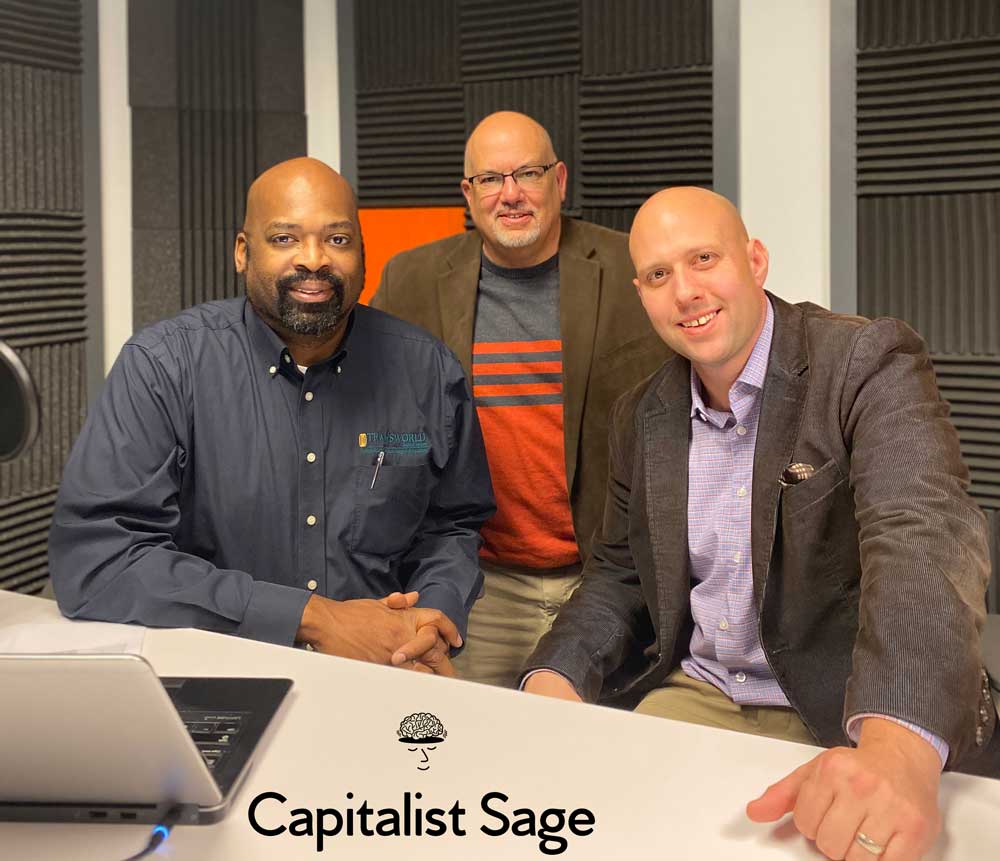
You may not think much of eating your fruits and vegetables, but Matt Scott, CEO of Press, Blend, Squeeze and our guest on this episode of the Capitalist Sage has something to say about eating healthy. After prolonging his father’s life through diet and nutrition, he went on to open up his health food business to keep his community healthy too. Join Karl, Rico, and Matt
as they discuss just exactly how he has worked his way into the health food business.
Social Media:
http://instagram.com/pressblendsqueeze
https://twitter.com/PBSjuice
Website: https://www.pressblendsqueeze.com/
Email: Info@PressBlendSqueeze.com
“As much as people know or don’t know you could really change the way that you feel, not only physically, emotionally. And so we changed his diet and instead of the five month diagnosis we had him for over five years through food. So literally from that, I felt a calling to put together a strategic business plan on how can we change and save lives through food. So that’s literally our mission at Press, Blend, Squeeze, that’s to save lives through food.”
Matthew Scott
Podcast Transcript:
Karl: [00:00:30] Welcome to the Capitalist Sage Podcast. We’re here to bring you advice and tips from seasoned pros and experts to help you improve your business. I’m Karl Barham with Transworld Business Advisors, and my cohost is Rico Figliolini with Mighty Rockets Digital Marketing, and the publisher of the Peachtree Corners Magazine. Hey Rico, how’re you doing today?
Rico: [00:00:48] Good. Good.
Karl: [00:00:49] Any sponsors today for the podcast?
Rico: [00:00:53] Well, Atlanta Tech Park is a major sponsor. We’re in their podcast studio, so Atlanta Tech Park here in the city of Peachtree Corners in Tech Park. It’s an accelerator just down the block from and right on the road of Curiosity Lab at Peachtree Corners. So this is one and a half mile autonomous vehicle track. For those that don’t know, it’s the only one of its kind in the Southeast and to some degree, the only open live living at lab, if you will, in North America or other States in the United States. So lots of things going on, and I’m looking forward to doing this episode.
Karl: [00:01:30] Absolutely. One of the other nice things is it is powered by 5g, Sprint’s 5g system here, so that if you have a company that wants to be on that higher speed internet mobility, internet system, you can work out of Atlanta at their park or others. Do test here. Run that. So just a great hub of technology right here in Peachtree Corners. Today we’d like to introduce our guest Matthew Scott, founder and CEO of Press, Blend, Squeeze Cafe and Juice Bar. I guess it’s a, it’s a local juice cafe, juice bar that opened up in the forum. There’s a couple of them here in the Metro Atlanta area, and we’re going to talk about starting and building a retail business focused on the healthy food movement. We know that everyone has been trying to get healthy and we see folks trying different types of diets, trying different types of alternative to the traditional fast food. And we found really interesting your approach and taking a look at this market and being an entrepreneur and trying to build one. So we want to talk a little bit about your journey in doing that. Matt, why don’t you tell us a little bit about yourself?
Matt: [00:02:50] No, absolutely. And guys, thanks very much for having me. I really appreciate it. You know, before two years ago, I was not in this business. So I was in corporate America for about 15 years, both from significant leadership roles in fortune 500 companies down to startup companies and taking them public all in high growth areas. And I saw an opportunity here and you know, it’s kinda like how most people get brought to changing their diets. It’s when you get punched in the face. And so myself, my dad looked at me and he was given five months to live. From the doctor told me that he had stage four esophageal cancer. And he was my best friend. And I’m sure like I did, like the rest of us would do and say, well, what can we do about that? What, what, you know what, what options do we have? And, you know, so diet is an extremely. Strong portion of influence into everyone’s life. As much as people know or don’t know you could really change the way that you feel, not only physically, emotionally and so we changed his diet and instead of the five month diagnosis we had him for over five years through food. So
literally from that, I felt a calling to put together a strategic business plan on how can we change and save lives through food. So that’s literally our mission at Press, Blend, Squeeze, that’s to save lives through food. And we do that multiple ways and we could get into that a little bit on, on, on that as we go forward. But that’s what we’re trying to do. We had the opportunity, I’m glad that you noted that, It’s just starting out here, down here in Atlanta. We had the opportunity, we were living in Chicago when we started this business, and we could have put this anywhere in the United States that we wanted to put it. Because we moved back to Atlanta to put it here. We saw a significant void in the Atlanta market in comparison to other areas of the country from a quick service, healthy restaurant and juice bar. If you’re driving around Peachtree Corners, there’s not that many options that you’re going to be able to get to. And people thank me each day for opening up and we’re truly seeing the snowball going downhill right now. From people, you know, grabbing on, we actually took over an old juice bar there, but people, it was out and closed for I think almost a year. And so we took it over. And so people are just beginning to realize that we’re back in there and, and they’re very thankful for it.
Karl: [00:05:52] So I can ask the question around you know, your background. Did you have a food background when you started thinking about nutrition background? Tell me a little bit about your background and, and how it helped you, you know, come up with the concept.
Matt: [00:06:07] Yeah, sure. So food background and if you call it this when I was putting myself in high school through college, I had the privilege of going to work for a quick service restaurant. That was the first location of then soon to be broadly franchised restaurant. So I was a hard worker. They brought me in and they allowed me to be one of their lead trainers and opener of new locations. So I got some good experience on how to take a model and replicate it and open it you know in, in a new location and to train the staff. In addition from a food customer service aspect, I worked in restaurants going through college to make Money. So I, I dealt with customers, delivered customer service, was able to take orders attentively and, and give that customer level of customer service in the food industry. But as far as you know being knowledgeable in the space, I was I consider myself a relatively healthy eater. I was always an active in sports physical working out and exercise. And, and so I would eat healthy, but my knowledge increased via doing my due diligence over the web and talking to industry professionals, doctors, nutritionists, et cetera. Once I started looking into it for my dad.
Karl: [00:07:46] So what, what, what most people don’t really understand about the food choices they make and how are you able to, to help modify your dad’s diet. What were some of the changes that you saw really have an impact?
Matt: [00:08:00] Sure. So after my father passed the, I, I was a little bit anxious. I said, doc, you know, my dad was 67. I got two young kids like this, you know, help me out here. And he said, you know, your father’s cancer was not genetic. It was not hereditary. Because there’s three things proven to fight cancer, and that’s eating clean, eating green, and exercise. So, you know, reality is, is that a majority of Americans, I would voucher to say that the majority of people in the world don’t eat enough green vegetables. Green vegetables that basic biology, it has
chlorophyll and photosynthesis, and that’s what gives your cells energy. It also allows your cells to reproduce, gives them the strength to reproduce at a high level. And so cancer feeds on deficient cells. So if you’re in, and this is, this is part of what extent am I, my dad’s life is by having cells that are strong and can defend themselves. Cancer got nowhere to live. I’m sure we’ve all heard stories of people being able to overcome cancer and become cancer free. And some of that’s through killing, you know, radiation and killing all those cancer cells. But that kills all the good with the bad. So if you do some research people have become cancer free through diets. And so greens are that prominent thing.
Karl: [00:09:42] And you know one question along that. Why don’t people eat more green? It’s here, here in the U.S., here in Georgia. What’s, what’s holding us back?
Matt: [00:09:49] Okay. So let’s be real. It is accessibility. It is convenience. Our lives are not going to get any slower. Our lives are not gonna get any less busy. and the food that we have at our disposal. Is a convenience factor. And it’s gotten to the place where the food industry is a business rather than a need. So you know, when we were all, go back 200 years in the United States and we’re farmers and gatherers and everything we ate to survive. Now, people, the food is a business. They’re trying to make it. What do you do in a business? If you’re not going to grow from a volume standpoint, you’re going to try to make it less expensive. And so the majority of food choices at our disposal are from large businesses that are trying to make food cost-effectively.
Karl: [00:10:56] So is this part of the movement that makes like Whole Foods, Sprouts, these types of places? Cause you know, on one hand you see these, these places that are popping up everywhere. So the, there is, for those that they can access it. They’re still not making the choice whether the, you are, you’re in a supermarket, they’re not building diets around fruits and vegetables and increasing the amount of greens in there.
Matt: [00:11:23] Well I would, I would be careful because the fastest growing segment of the supermarket is organic vegetables. If you’re looking at all the areas.
Rico: [00:11:33] I mean, I can see when I go to H Mark, for example, and you go to an Asian supermarket, you will see a big area of vegetables. When you go to a Walmart, only recently have they increased it a little bit and only in those areas where they’re competing with an H Mart or something along those lines. So Americans still are not consuming. You’ll find South Americans use farm communities that are first generation, maybe American. They’re still consuming that. But as they get further away from that generation they’re going back to the processed stuff, they’re going back to the easy stuff.
Karl: [00:12:09] I mean, when you think about it and growing up in New York, how many fruit stands you would go to fresh if you’re in Brooklyn picking avenues. And the city…
Rico: [00:12:23] Tomato, tomato is the big one over there.
Karl: [00:12:23] All of these places that, that had that. And so yeah, accessibility made it easier for people to get fresh, good quality, healthy, healthy food choices. And, and so as part of that, the shifted in parts of the country where, where that tradition wasn’t there and it was more based on supermarkets, they were, where they can control. What people are selecting is, is impacting that.
Matt: [00:12:51] Yeah, I agree. It’s so, it’s accessibility. It’s knowledge. So you know, people say, Oh yeah, I like to eat healthy, but they don’t necessarily know what that means. So like it’s, it’s being able to, to truly understand, you know, even my father, you know, he would even joke to me and be like, Oh, I’m eating an organic banana. And I’m like, well, you don’t have to eat an organic banana. The skin on the banana protects the banana, like so, so like it’s the knowledge of you know how to do it. But it’s also, there is so much of an emotional, psychological, it’s almost reactive because we’re so busy. So all of a sudden instead of it, you know, you being conscious about what you’re eating, your brain goes, Oh, I’m hungry. And. The reality is, is studies show that sugar is eight times more addictive than cocaine. And what you can find is in majority of that quick service food that you have an emotional reaction that says, I’ve waited so long, I’m starving. Now I need to go get something to eat. Let me pull over into this drive through. I’m almost certain than almost any option that you choose there has sugar in it, high fructose corn syrup in it. And, and, and so your body reacts. And there’s, there’s a, an emotional receptiveness that goes off in your brain, that says that.
Rico: [00:14:18] You brought something up that really, and I haven’t seen this, and then it doesn’t make sense to me now that you’re talking about this, is that you have Starbucks, you have Dunkin donuts. The majority of what they sell is true through that drive through. You’ll never see a Starbucks without, without a drive through. But there was one that I remember, there was located somewhere and they asked and they got a rezoning, so then they were able to have a drive through through that one because that was the only way to save that store. And I have yet to see it think a drive through juicing bar. And it doesn’t take long to, to create it. It’s just as long to critical lotta. I think in a, in a Dunkin, not sure. So I haven’t seen that and that we talk about how easy, if that was easy, if I could drive through that, I probably would get that over something else.
Matt: [00:15:06] I’m sure. People ask for it all the time. It’s, it’s absolutely on the radar as far as like convenience. Now what I would say is that it because a lot of times you’re making it to order. It’s not going to be necessarily the speed of others. But you know.
Rico: [00:15:28] I’d wait there for a minute. I mean, it doesn’t take long for, depends on the process.
Matt: [00:15:33] Yeah, no, it’s, it’s absolutely on the radar. We’ve, we’ve discussed it. We’ve looked at locations. We’re not there yet as far as, you know, but it is on the radar. And I’ve had a lot of people bring up the convenience factor. So it goes back to three things. It goes back to
convenience. It goes back to knowledge, and it goes back to emotional, kind of reactions and, and, and addictions to sugar. And, and I even go to people, the, the, the misunderstanding that healthy can’t taste good. So a lot of people kind of coined. I used to have people come into our Dunwoody location and the, the wife and the kids would order something and the husband was there and I said, Hey, you know, can I get you something? He goes, I don’t eat healthy. And I said, well, hold on. Like, what? What, what does that mean? I was like I was like, you don’t like guacamole? No, no. I like guacamole. And I go, well, hold on. Can we get you some, a Turkey wrap with some, some hummus and some roasted peppers and some, you know balsamic glaze on it, man, it sounds really good. And then, you know, I’d say, well how about PB and J smoothie tastes like a peanut butter and jelly sandwich but doesn’t have any sugar in it, but it’s really good. Oh, I like PB and Js. Avocado toast, soup. Like they’re like, Oh man. And then they eat it and then they go, man, this is really good. I go, I guess you eat healthy. Like, so it’s that coined a misconception of it’s true, healthy can taste good.
Rico: [00:17:14] And you also have food though, right?
Matt: [00:17:15] Oh, we do. Yeah.
Rico: [00:17:16] See now that didn’t, and I know that vaguely you have food there, I haven’t been into the store yet. But I would not realize that. I think if I was passing by would think juice point. I wouldn’t think food just that. But you do have a menu though?
Matt: [00:17:30] Absolutely. We do about 50% of our business in food, we do a ton of catering. One of our biggest growth pillars is in corporate catering. You know, when I was in corporate America eating the same, we would cater probably three to four times a week for lunch. And it was kind of from a rotation. And, you know, I’d get a pizza. I could tell you I’m probably going to get pizza. I can tell you, I might get a fried chicken sandwich for breakfast. And you know, I might get Mexican or some type of Southwestern and majority of those after I ate them I was ready for my couch. And corporations are realizing this and, and they’re actually like. You know, some of the large corporations and the reasons why we chose these locations are strategically positioned to align with those corporations. So like Newell Rubbermaid further snack attack on a quarterly basis caters 600 as eyeballs from us IHG regularly for their executives. I’m actually in February, I’m going down and meeting with the CEO’s executive assistant, and she has 14 people that report up to her, that schedule for hundreds of people, but we’re giving them a tasting of our lunch. I mean, so we have these large corporations that are not only providing lunch for their employees, but they’re being more conscious of what they’re providing because it’s actually leading to productivity. Like they, they, you know, they’re, they’re going back and not trying to, you know, relax at their desk.
Karl: [00:19:19] No, I was going to say, I remember doing meetings and corporate training around the world for, for years, and we’d have four or five days of, you know, catered and meals and so on. And we would always, I would actually ask for certain menus on certain days because what happens right after lunch and they come back in and that energy drop.
So we would actually specifically pick activities and exercise right after lunch, which had movement. Kind of wake people up because those heavy lunches, they’d come in with pasta and folks would be ready to go to snooze town and, but, but even having options that gave energy boost you. The afternoon snack break would have muffins and donuts and cakes and cookies. And we started shifting to nuts and try and start a team that shift. But that was my two choices there. There wasn’t a menu of stuff that people could do on that break time. that helps boost that productivity that, that you were mentioning. So, so, so I think that’s, that’s, that’s something that’s seeing, that’s happening in the market.
Rico: [00:20:27] Also, we were talking a little bit before the show before you showed up, and we were talking about how it’s Amazon proof almost. You can’t ship, you can’t ship certain things. You still gotta eat, you still can’t go out that way. But how, how do you find the challenge of doing, you opened a brick and mortar store? You didn’t have to build it, obviously it was built out and you’re there.
Matt: [00:20:49] We build out our last one, our first one. Yeah.
Rico: [00:20:51] So how do you find that? How do you in a world where people are shifting away to Amazon ordering, like I said, over Amazon proof. Or Uber, Ubereats, Dash, Door Dash and stuff like that. How do you find that? How did you find it opening up a place like that? That’s not a franchise essentially.
Karl: [00:21:12] You chose brick and mortar and retail location to deliver this concept. What were you thinking? How do you, how do you, how do you make that decision?
Matt: [00:21:22] So when I experienced the benefits of what we provided, like, and I would encourage anybody that listens to this podcast, I’d encourage you guys go in and grab a juice, go grab a roots and fruits, which is a juice that has some beets in it and has a little bit of orange and ginger. Tell me how you feel in 30 minutes. Dynamically different than anything that you’ve ever eaten or drinking or drank from any other place. So, you know, the reason or how I did that is said, man, this is amazing, you know?
Rico: [00:22:07] But, but how did you find, how did you develop the idea into a business? I mean, how you, you had to open a brick and mortar. What did you fit. You know, buying equipment, the ingredients. How, what’s the actionable side of that?
Karl: [00:22:22] The rest of their business. Often the products, the product and the need is clear and you’re matching those two up, but you’re running a business, right. And it takes, it takes a bunch of things coming together.
Rico: [00:22:33] And this is the second location, right? That you have. So you’re working towards either a chain of them or franchising at some point? How is that working? Doing that?
Matt: [00:22:41] So, so again, I go back to my experience. I was part of a startup. When, when, when we’re, when I was at a startup, we wear many hats. I got recruited actually I should say when I was part of Rubbermaid and my initial job was for a division that started around 30 million. And I got put into at a young age, I’m blessed. And, and believed in by a president and a mentor that gave me significant responsibility to take that 30 million of vision, gave me a significant amount of budget. The ability to strategically put the Strat plan together and grow that business within four years to 150 million globally. I got tapped out of Rubbermaid and recruited out of Rubbermaid to go be part of the largest office products company in the world. And then they brought me in with a pipeline funnel of zero, and they said, we brought you in here because your skillset is different and in the need of nothing that we have internally. And they tap me. And within two years we had a sales funnel of over 150 million in the pipeline. And I had a team of eight, you know, rolling up to me. And so I wrote those trap plans. I built those trap lines. So the way that I did this was I treated this, I said, Hey, there’s an opportunity. Let me, let me develop this business as I would develop any other business. So I went and sourced out partners. I went and did my research on how other competitors were running. I identified machinery that we needed. I put together the menu. I oversaw all the marketing. And I mean, like we, we’ve had wildly success in two years. That, that I like feel so good about, I mean, and blessed honestly, we get like almost 9,000 unique people that have come into our store and given us their telephone number and said, Hey, we are okay with you contacting us, here’s our telephone number. We want to be part of your membership program. Like, I don’t see businesses that are like national brands even, you know, doing that in, in single locations and stuff. So, so we’ve been putting the right strategy around the business to, to have a performance or whether I have experience or not, I treated it like any other business or any other product line and I was about to grow and, and put the…
Rico: [00:25:26] Any challenges that you’d like to share that you’ve overcome?
Matt: [00:25:28] Yeah, I mean, we all got challenges. But I would say, you folks that are entrepreneurs is, be careful of your blind spots. We all have, we all, we all have things that we overlook. You know, one of the biggest hurdles is going from one to two. So as an entrepreneur, you’re at that location. You’re there, you’re, you’re, you’re a part of that location. Yeah, you can’t cut yourself in half. So you know, I would say you know, put the process in place, you know, and just because, you know, the process, operational efficiency and, and that’s something that we had to build out. And, and it’s, you know, a continuous work in progress.
Karl: [00:26:29] So I, I would, I think, I think what you’re describing though is. You know, a theme across big corporations or small business, and it’s the question of scaling. I’m doing it once. It could have been lucky. Right time, right place. Stars align. A thousand reasons why you’re able to achieve success. And sometimes it’s brilliance and hard work. But to replicate it in another location. What are some of the things that would, you know, knowing what you know now, you would, you would advise someone going, thinking of doing, you know, multiple, like what would be things they can put in place that would ease that transition, right? To grow?
Matt: [00:27:13] I probably, we say to people to create a network, right? Because we’re all good at something and we’re all not good at everything. So by having a network of, a sounding board or afforded a trusted board of advisors, it allows you to be stronger in areas that you’re weak. So it allows individuals that might be able to be stronger in certain areas to help you strengthen, sharpen, or have a visible blind spot.
Karl: [00:27:54] I think, I think you’re hitting on something. If you’ve seen many successful people and they talk about this success, there’s usually a network of advisors they have. Even if you look at a large corporation, they’ve got a board of directors, nonprofit governing boards. There are these folks that serve multiple functions. One is to hold a mirror up to you and say, Hey, you know, I know what you’re saying and seeing, but here’s what I’m seeing and here’s things you may not notice. May, may help with the blind spot. They have wisdom and advice to give in the area that you may have the expertise to be able to do that. Third, they can help hold you accountable if you said you were going to do something, if you’re the boss who’s gonna, who’s gonna challenge you, if you decide, ah, we’ll do that next month. But, but, but if you have that advisory group, they, they can be in a position to hold, hold you accountable for them. And the last one is some of the networks that that affords you. they know people that might help you be more successful. And it’s one of the things we often see entrepreneurs struggling with. They eventually build it. We were talking earlier about these groups that do that. But they may have got 15 years of pain in before they realize, man, if I only knew someone that knew about payroll and what can happen if I mess that up.
Rico: [00:29:15] It’s like anything else in life. If you’re a writer or you’re a sports person. Everyone thinks you’re an overnight success, but it took you those years of pain to be able to get there. And most people don’t want that. They want to be able to see success. And maybe you get that advice from that successful person or that team of people to help you get there.
Karl: [00:29:35] Absolutely.
Matt: [00:29:35] Yeah. I’ve been, I’ve been really fortunate and blessed for the people in that have come into my life and, and you know what? A lot of times people have the desire to help people, you know? Sometimes you just have to ask for it. Other times you just, you have to go look for it. But, but people want to help people. And, and so you know, entrepreneurs often like to think they have to do everything themselves. And, and that’s something that an additional piece of advice I would give to entrepreneurs is, you’re no good to anyone if you’re burnt out. So give yourself some space and give your team some trust.
Karl: [00:30:24] No, I agree. I said, the one thing you can’t manufacture and create more is time. And so there’s only so much time that an individual has, and as you grow a business, it actually requires more time very often. And if you don’t build a team to support, it supports you to be able to do that. It makes that a, a challenge. So tell me a little bit about what you got going on next. What’s next for the company and for you?
Matt: [00:30:50] So for a, happy new year to you guys, 2020, it’s going to be a great year. We are gangbusters into new year’s cleanse programs. So it is the best way to reset your palate, control your addiction to sugar, get you jump started into your nutritional needs. It’s amazing the results that we see. We’ve been doing this for over two years. People come back re-energized, they sleep better, their skin’s better. And this is in three days. They, last time I did a cleanse, I lost eight pounds. I hear that over and over again. But you’re refreshed, you’re rejuvenated, and then crazy enough you might think, Oh yeah, I’m you know, after three days I’ll be ready to eat a cheeseburger. You know what? You’re not like, you’re ready to go down the road of, you know having that healthy palate, that healthy diet, and it’s, it’s crazy what it does for you. So that’s, that’s number one. Number two, I would ask any business within this kind of Metro Atlanta area to give us a chance at catering. Everybody has a need one time or another, probably in the next couple of weeks. I’m sure every single business has one lunch that they’re going to be looking to serve to multiple people. Give us a chance, put us in there. And, and, and I think you’re going to love it. I think you’re gonna enjoy it. And I want to be talking to you about your second order. So give us a catering opportunity because it’s a, it’s, it’s totally an awesome experience. And we got resoundingly reviews and feedback from it. So we’d love to work with people.
Karl: [00:32:34] Awesome. I’m glad. Well, located in the Forum your first location is where…
Matt: [00:32:41] It’s in Dunwoody Village. So where the Fresh Market is, or if you know where Village Burger is, or if you know where the post office is down there, so it’s in Dunwoody village, which is getting rejuvenated as well. So that’s kind of exciting.
Karl: [00:32:55] How can folks reach, you learn more online. social media.
Matt: [00:32:59] So we got thousands of followers on Instagram and which is @PressBlendSqueeze. The location here has Press, Blend, Squeeze at Peachtree Corners. Facebook Press, Blend Squeeze. If anybody wants to shoot me an email, if they have questions about a cleanse Info@PressBlendSqueeze.com comes directly to me. I see them all. I’d love to do a group cleanse. We’re doing it with a lot of gyms. So we had, last week, we had like 70 days of cleanses go out. And, and so this next week we’re partnering with another gym here in this area. And, and we have a couple more on the radars. So it’s, it’s time. Do it for yourself. Do it for your family. Do it for your energy, but do it to feel better. So it’s, it’s pretty cool.
Karl: [00:33:56] Well, I want to thank you very much for being our guest today. Our guest, Matt Scott, CEO of Press, Blend, Squeeze, for your time today and sharing part of your journey and, and inspiring others that may be thinking about making a change in their career and their life. And finding ways to do it in a way that’s aligned to something that you’re passionate about. Being healthy and how to, how to solve this problem where folks can’t find it as convenient to get nutritional greens into their, into their bodies that they can. So we really appreciate your joining us for that. We also wanna thank Atlanta Tech Park for hosting us every time we have one of our episodes here to Capitalist Sage Podcast. If you’re starting a business and looking
for a great environment to come and work and be around people that are going on this entrepreneurial journey along the way with you, it’s a great way to build network. Entrepreneurs sometimes can be a very lonely endeavor. So having other founders and makers and, and business leaders to collaborate with is, is really, is really powerful. I’m Karl Barham with Transworld Business Advisors of Atlanta Peachtree. Our business advisors are available to consult on your business, whether you’re looking to improve or grow the business, or you’re looking to exit or start a business. You can contact any one of our agents to be able to help you with that are available at www.TransworldBusinessAdvisors.com/AtlantaPeachtree. And Rico, why don’t you tell us a little bit about what you’ve got going on and going to the next couple of weeks.
Rico: [00:35:32] Sure, so I run Mighty Rockets. We’re a social media online company. We provide content branding and whether it’s on LinkedIn or Instagram and soon to be Tick-Tock, cause there is a market out there and believe it or not, in the United States, it’s like 24 million users and tick tock and 40% of them are between 18 and 24. So that age. Voter age, if they felt maybe so, I do that. That’s MightyRockets.com. But I also published Peachtree Corners Magazine and you could find, you could go to LivingInPeachtreeCorners.com and find our website. We talked about what’s going on in the city. We’re doing several podcasts upcoming in with Peter Coin, his life with some interesting guests. Also Prime Lunchtime with the City Manager is coming up Thursday. After the fourth Tuesday, we’ll be discussing what’s going on in the city of this month and let’s what the city is planning over the next few months. A lot of new stuff happening out there and we’re working on the next issue of Peachtree Corners Magazine and the cover story, I believe that comes the story we’re working on right now, and it should be, the cover is innovative and innovative companies and organizations in Peachtree Corners. I will be doing some podcasts as well for that to complement that. So this is just a lot of stuff going on. So if you’re looking for any either trends to reach the audience here on Peachtree Corners through the family podcast, or you need someone to work with you online or branding, that’s what I do.
Karl: [00:37:03] Oh, fabulous. Well, you know, I really look forward to the next edition of the magazine and folks, if you go around and take a look and read through it, just knowing what’s going on here in the local community, whether it’s business, whether it’s what’s happening in the political team, what’s happening with, with, with various organizations. It’s just a good way to keep up with events and activities and in the area. So one of the thank you for that. That’s all we have for today. Look forward to talking to you some more and having some more great guests like Matt Scott that came to visit us today. Thank you everyone.
Related

Business
The Forum Gives Sneak Peek of New Eateries and Community Spaces
Published
2 days agoon
July 24, 2024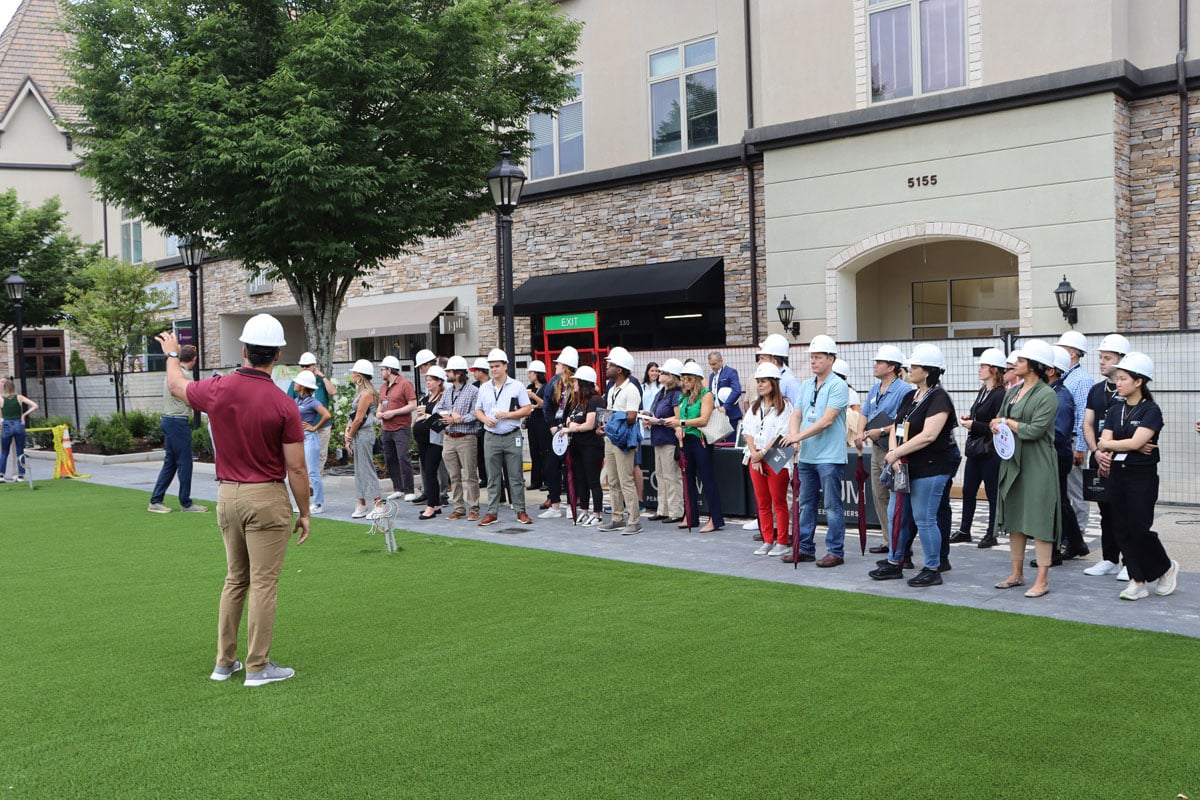
If you’ve been to or near the Forum in the past few months, you’ve probably noticed cranes and construction crews. The anticipation of the first phase of renovation of the 22-year-old retail center has left a lot of Peachtree Corners residents as well as nearby patrons excited to see changes.
The Forum administration invited the media for a hard hat tour on July 17. The event showcased the redevelopment progress ahead of The Plaza’s grand opening on Aug. 8.
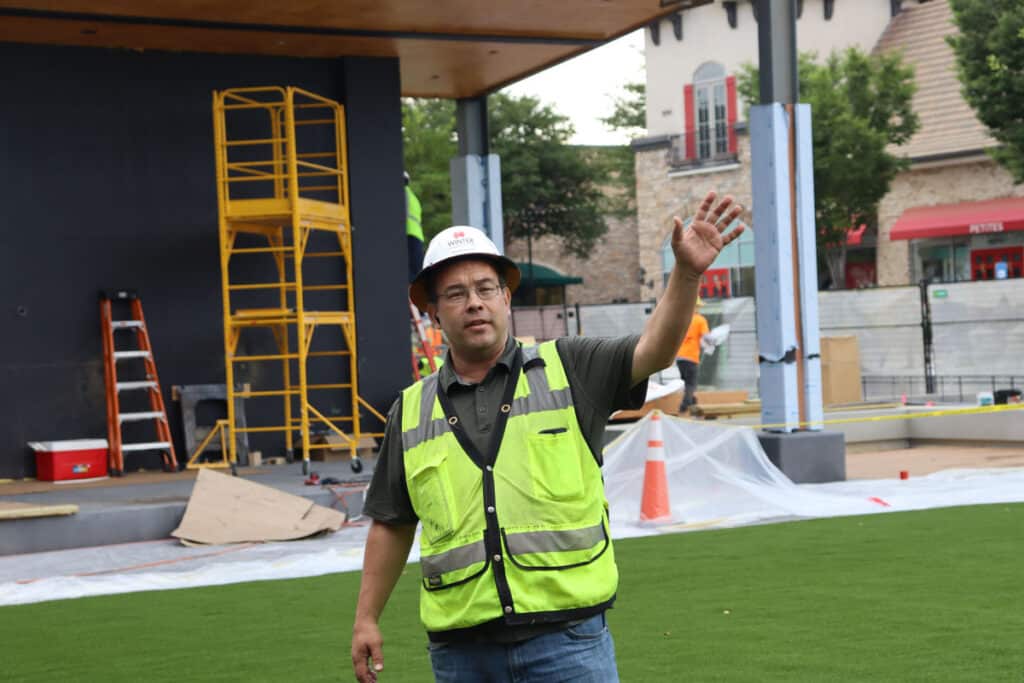
Scrumptious bites incoming
Executives from the development and leasing teams joined on-site management and led attendees around the new central gathering space, guest amenities and Politan Row, the newly created 10,000-square-foot food hall.
Dining concepts from veterans at Sheesh, Twenty-Six Thai and newbie Gekko Kitchen were the first food vendors announced for the space, which is expected to open in January.
“We can’t wait to introduce the Peachtree Corners community to our food hall experience,” said Politan Group CEO Will Donaldson in a news release. “Every detail from the design to the bar program to the cuisine is thoughtfully curated to inspire guests to not only mingle with one another but to connect with our incredible restaurateurs and discover new favorites.”
During the tour, Donaldson explained that eventually there will be seven different global cuisines in the Politan Row food court at the Forum featuring well-known and up-and-coming local talent. Once complete there will be a central bar, a private event venue and a covered outdoor patio.
“One of the things that we’re excited about is this unique design that we’ve come up with, that’s very specific to this area,” he said. “We’ll be open seven days a week for lunch and dinner. Whether you’re with a group for lunch or with your family, it works great for multiple settings.”
Twenty-six Thai owner Niki Pattharakositkul said the restaurant will work with local vendors to source the freshest meats and produce possible.
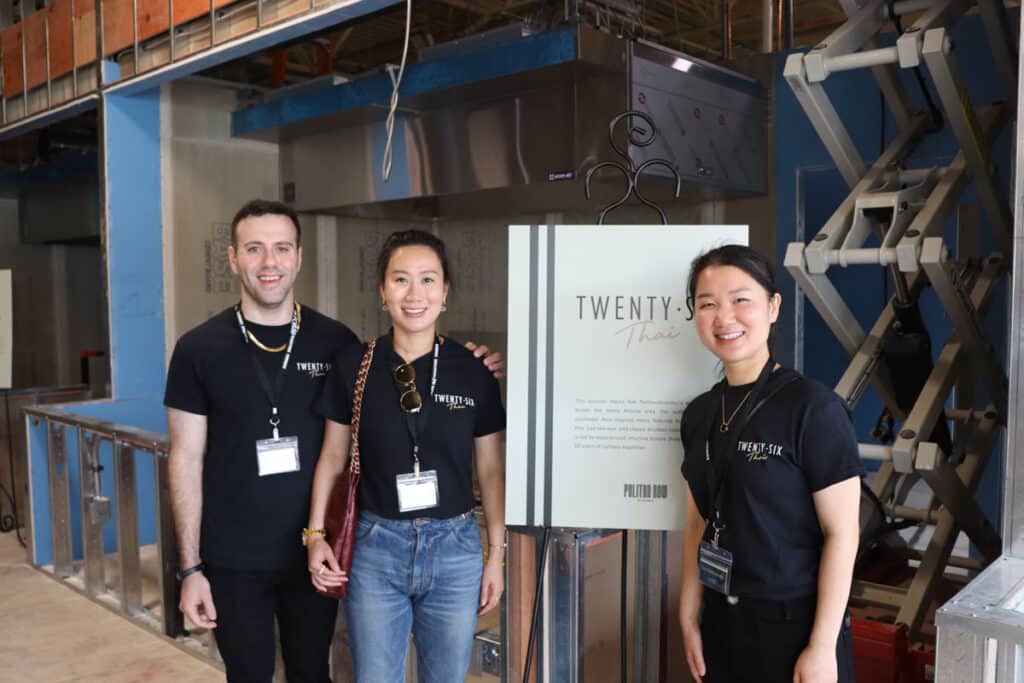
“There are certain types of produce and protein we try to source locally, but sauces and the more exotic produce and herbs, we have to import from Thailand,” she said. “Our brand is trying to move towards doing things locally and sustainably.”
Working with organizations such as Georgia Grown limits the use of large food distribution companies. Since starting Twenty-six Thai in 2016, Pattharakositkul has launched seven locations across metro Atlanta, including at Politan Row’s Ashford Lane and Colony Square.
The eatery describes itself as an “authentic wok-fired Southeast Asia-inspired menu featuring items such as pad Thai, pad see ewe and classic drunken noodles.”
Sheesh, a Mediterranean concept that uses simple, wholesome ingredients prepared with unique spices and blends, is run by corporate executive chef Charlie Sunyapong and director of operations Raquel Stalcup. The two are also members of the group behind full-service restaurants Stäge at Town Center and Pêche at the Forum.
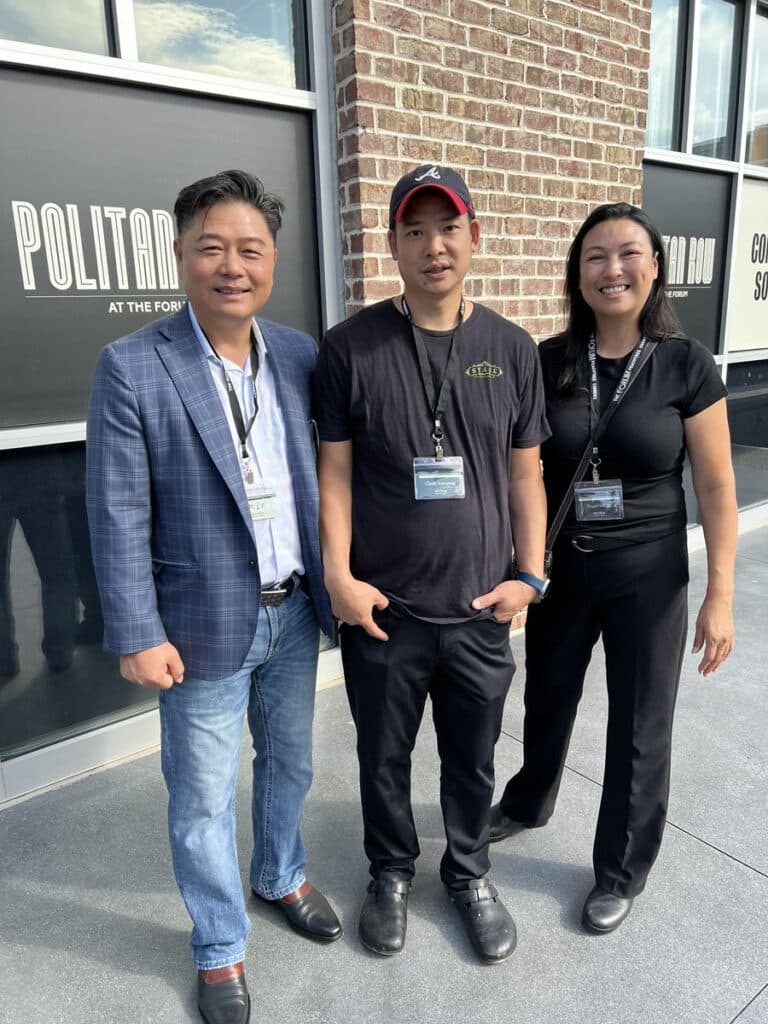
The popularity of those suburban concepts has already taken off. With Sheesh, they’re looking to do something different.
“There are going to be some things that are unique to Sheesh that you’re not going to get at the other places,” said Sunyapong. “You’re not getting a whole restaurant; this is quicker fare.”
Gekko Kitchen, a former food truck transformed into a hibachi and ramen experience, will be serving fresh, fast bowls that are more colorful and lighter than traditional hibachi fare.
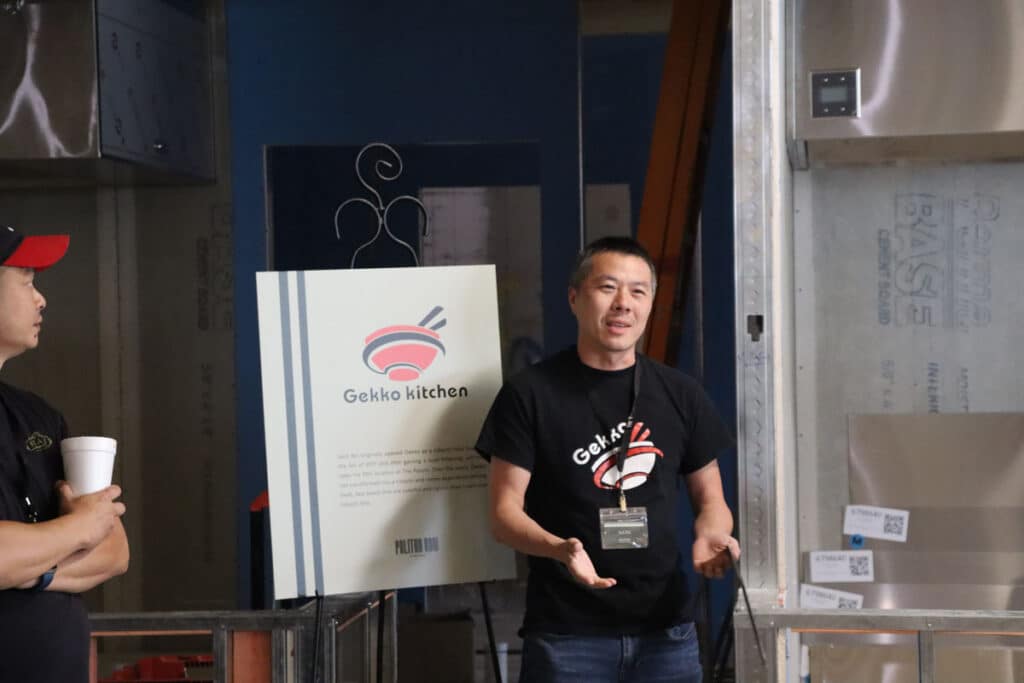
Gathering spots
Development Manager Nick Lombardo explained that NAP is moving away from building big construction projects from scratch like Colony Square in Midtown Atlanta and Avalon in Alpharetta.
“As a company, North American Properties pivoted around 2020 from building big ground-up construction to more redevelopment with already existing properties,” he said. “With the thought of great assets that just need a little more attention Infused into them to create value, we bought the Forum in 2022.”
He said that value-add propositions done at The Forum will create a more walkable center.
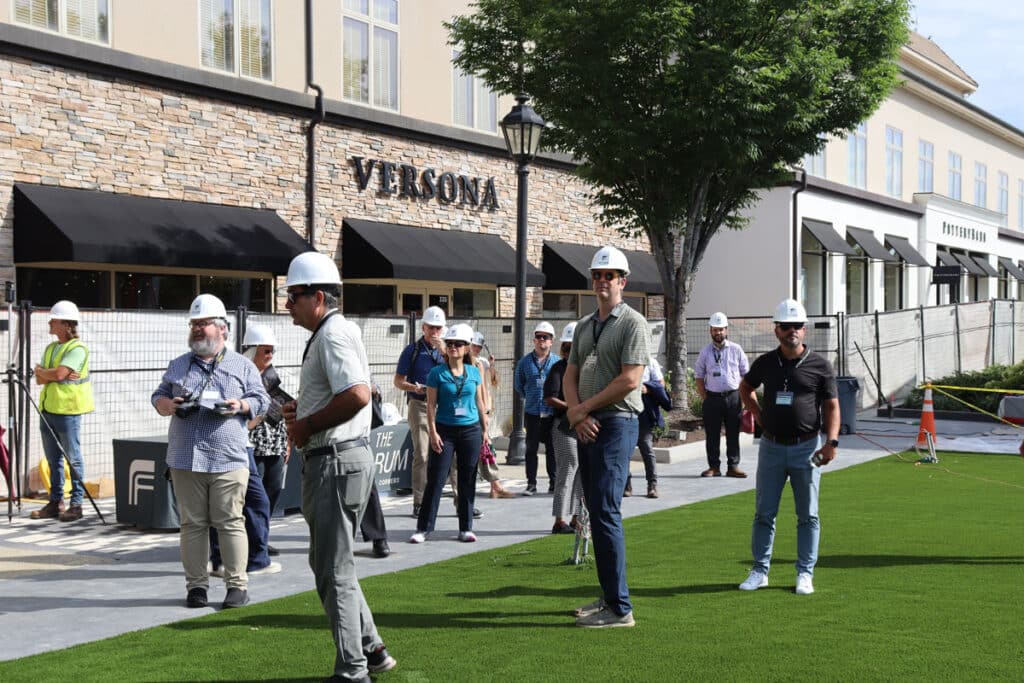
“Trying to compete with the internet on convenience is a very tough task, so the way we differentiate is by experiences,” he said. “We host between 150 to 200 events every year. We have things like concerts, wellness and fitness events and we have child playtime events. Our marketing team does a great job and they’re the differentiator when it comes to what makes our property stand out.”
By the first week of August, a large gathering space will be unveiled in the central area of the property between Pottery Barn and seafood restaurant Pêche. It will have a nine-foot LED screen capable of hosting movie nights and sports viewing. There will also be musical performances featuring local artists.
“We’re not in competition with Town Center,” said Charlotte Hinton, marketing manager at The Forum. “Town Center has gates like a real music festival and we’re more like a ‘chill and enjoy the music’ vibe where you can grab a beer and hang out or maybe kind of walk around.”
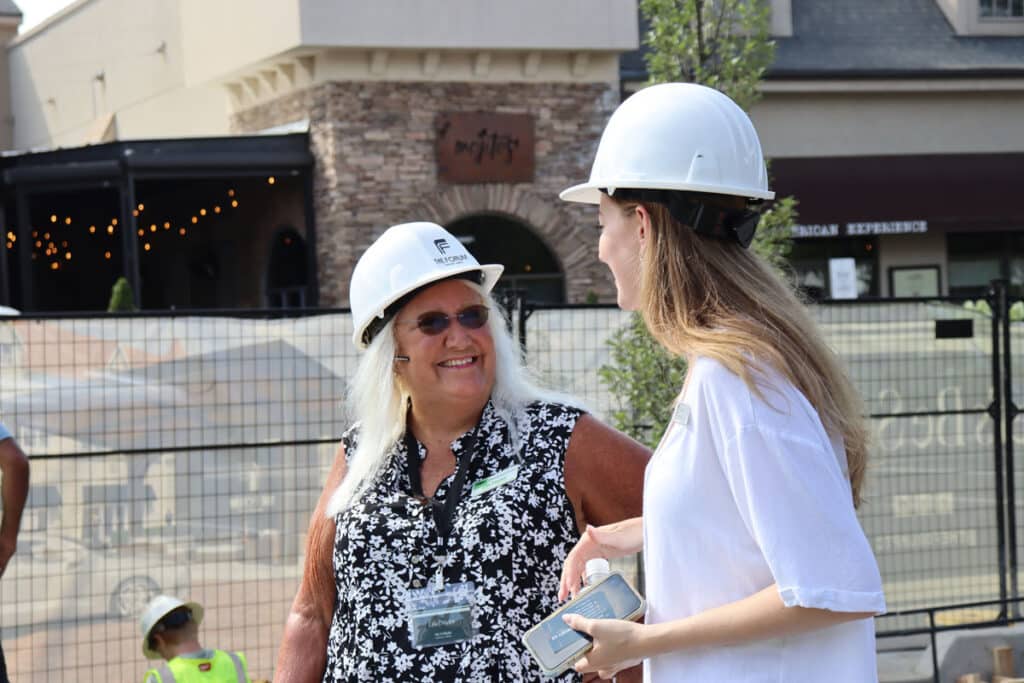
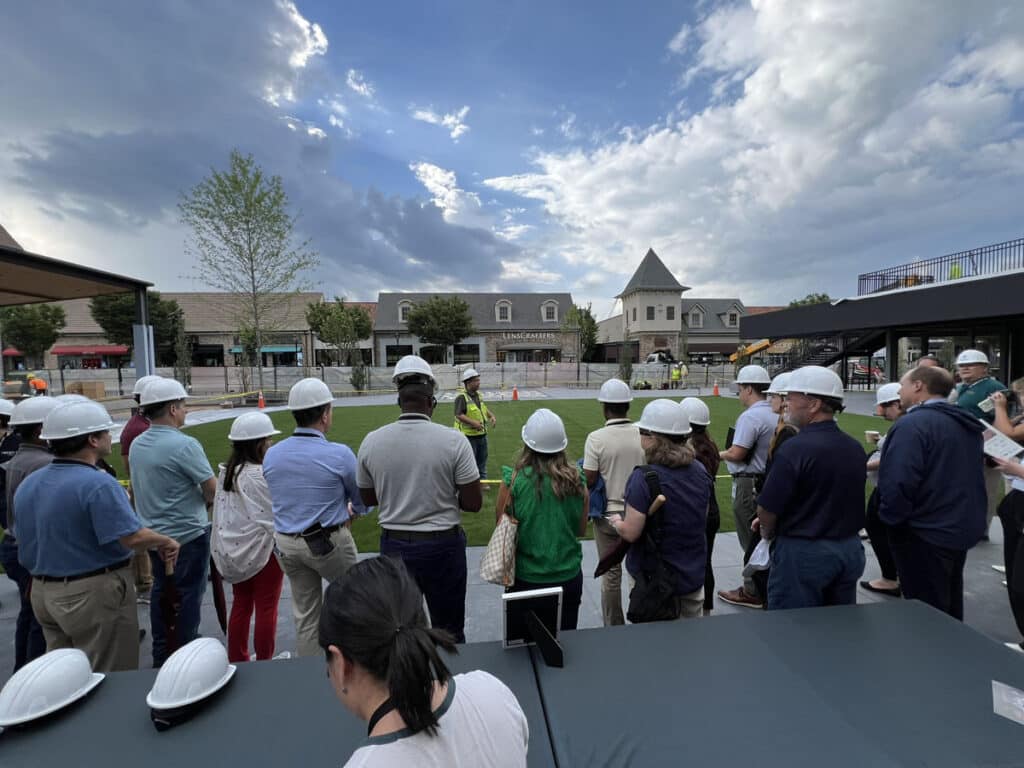
The smaller space and artificial turf are unlike the Town Center space where attendees spread blankets and bring chairs. The Forum will have furniture and seating in the space so folks can just gather and either enjoy time with family or partake in events.
The Forum will also offer valet parking on a limited schedule at that end of the property.
More improvements
Although the construction equipment will have moved out, the jewel box building will house a yet-to-be-named restaurant that will open early next year.
“We’re pretty much done with what we’re doing as far as landlord work,” said Lombardo. “We ask our tenants to bring their brand and their design and their material pallet and put that on the building to express their brand identity. They know their brand better than we do. They know how to best design their building and how it functions and works.”
It’s the same process with retail stores, he added.

“We always ask all of our new tenants to come in here when they’re building their storefront,” he said. “They’re not just selling their clothes; they’re selling a lifestyle in the brand so we ask them to push their brand out to the street.”
Even with the new spaces, there will be no shortage of parking, Lombardo added. “There’s plenty of parking behind these buildings,” he said pointing toward Pêche. “What we’ve done is enhance the connectivity to those areas. We’ve redone this breezeway and we’re adding lighting and connecting the parking lot to the main boulevard here. The goal is to replace cars with people and activity and bring a sense of community to the property.”
Related
Business
Taste of Peachtree Corners: PCBA Showcases Local Restaurants
Published
1 week agoon
July 17, 2024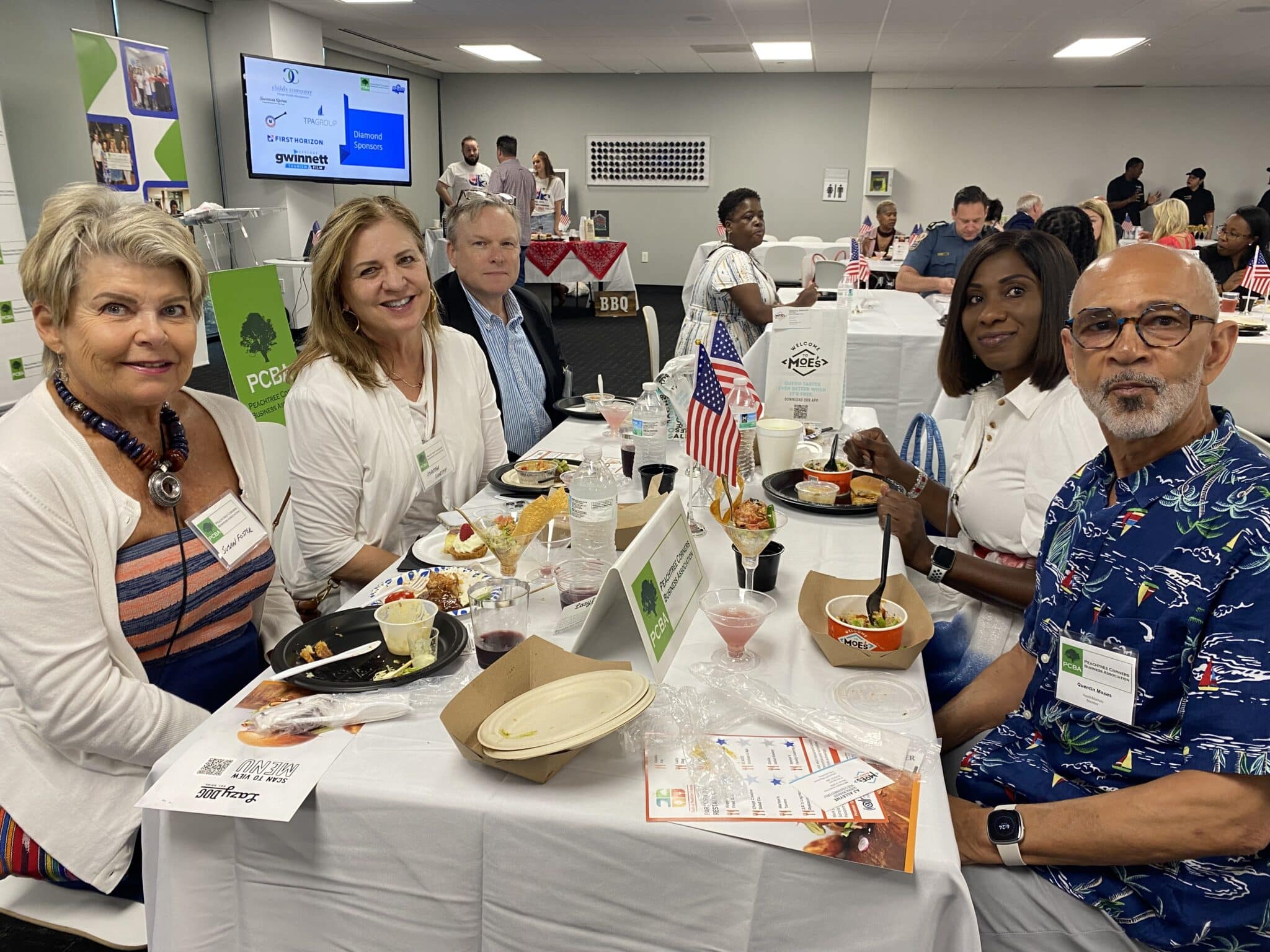
The Taste of Peachtree Corners has been in the works for years, but the COVID-19 pandemic put many key events on hold for the Peachtree Corners Business Association (PCBA).
But luckily this year, the dedicated staff of volunteers successfully executed a memorable event and introduced a lot of local business owners to their neighboring restaurants and caterers.
As I walked up to the Community Chest Room at Peachtree Corners City Hall on June 27, there was a line outside the door. I later found out that over 100 people had registered to attend the event. I got checked in quickly and was faced with a “passport” of 10 Peachtree Corners restaurants serving everything from high-end bakery items to good old-fashioned barbecue, and modern twists on seafood and American cuisines.
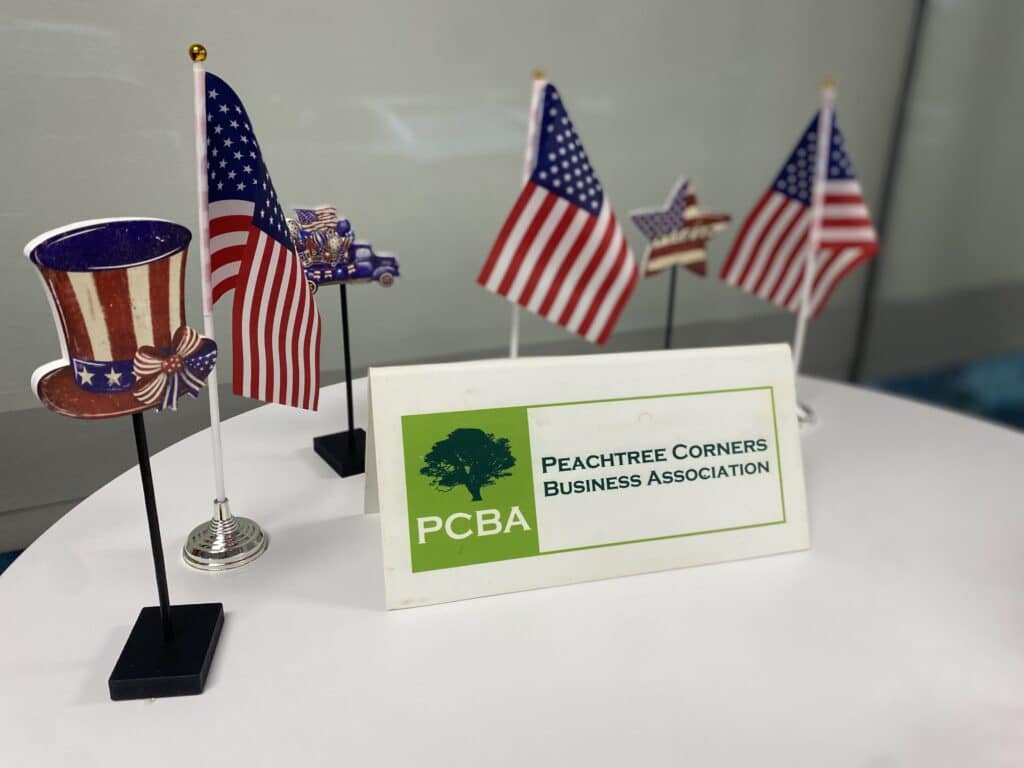
Let’s talk about the food
The idea was to visit all 10 restaurants and collect stars while trying samples and small plates. My first stop was Firebirds Wood Fired Grill, and they had my favorite – homemade chips and queso. The queso was smoky and mildly spicy with a great depth of flavor. What a great start. Next up was Chopt. Creative Salad Co. I had never heard of this restaurant before, but they blew me away with a perfect amuse-bouche of cherry tomato, pesto, mozzarella, and olive oil. These guys understand simple and fresh Mediterranean flavors.
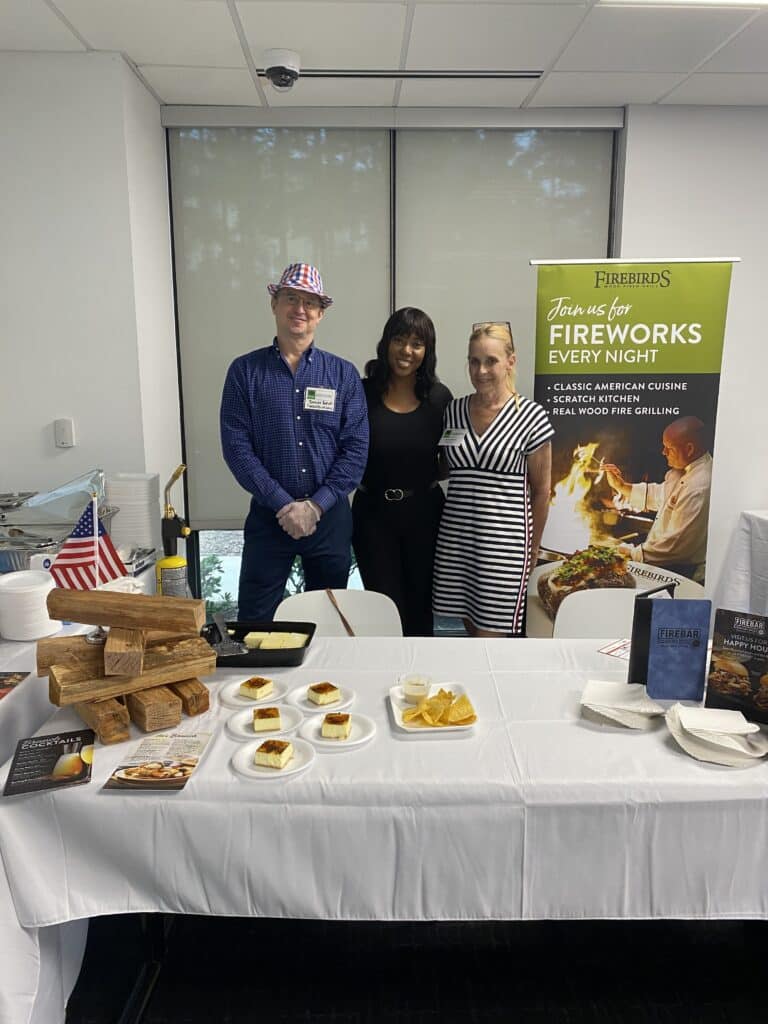
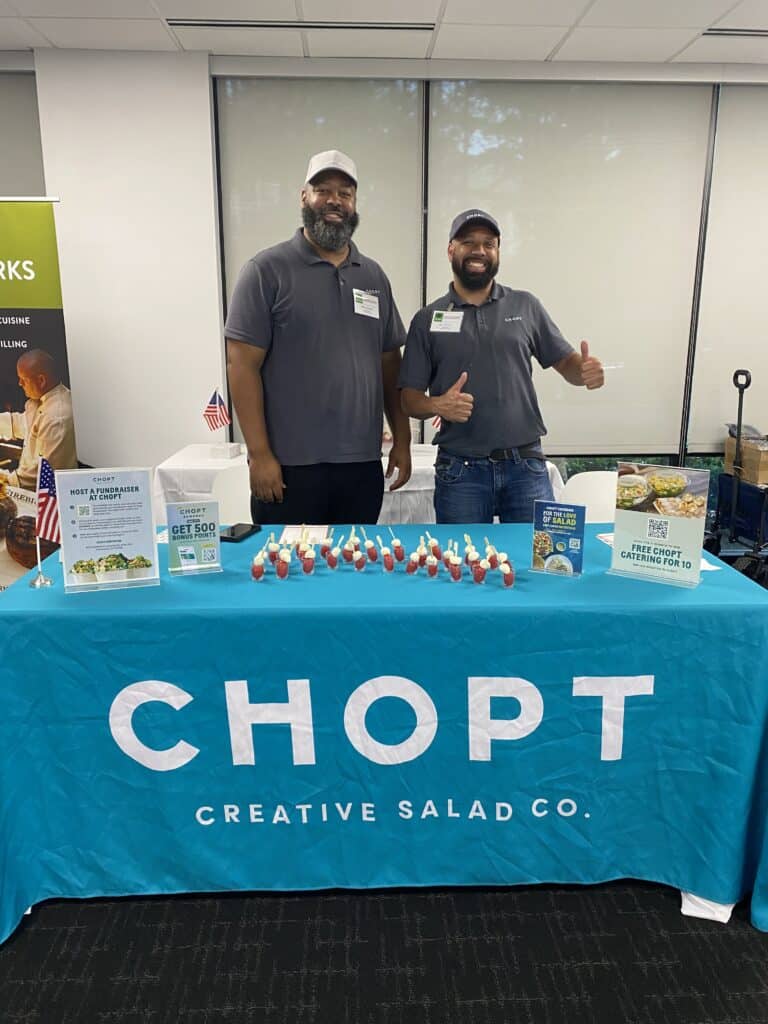
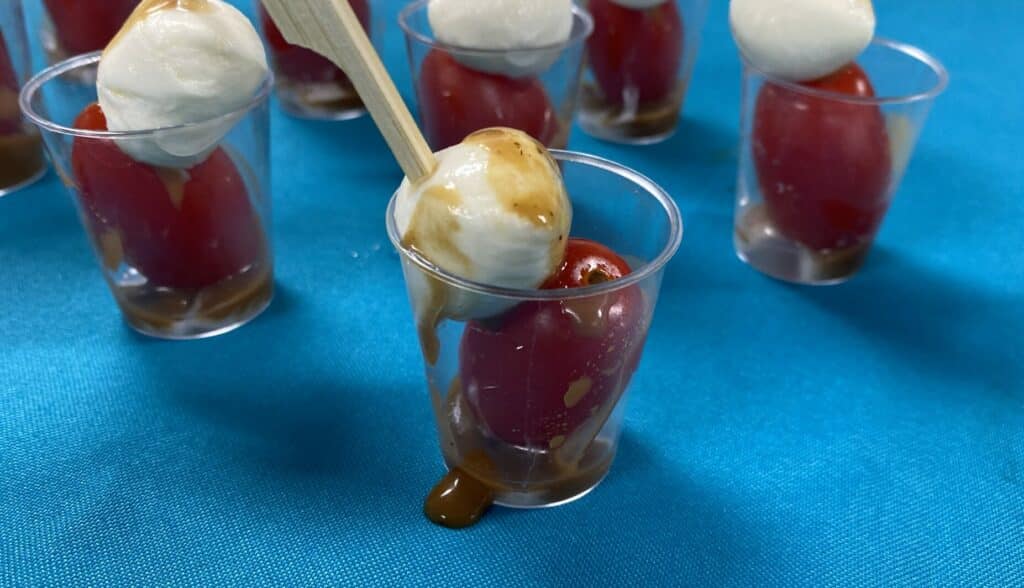
The folks from Marlow’s Tavern were also on-site serving shrimp and grits with jalapeno, spinach and tomato beurre blanc. This is definitely the style of elevated food I’ve come to expect from Marlow’s. And as a nice touch, they prepared a refreshing blueberry cocktail.
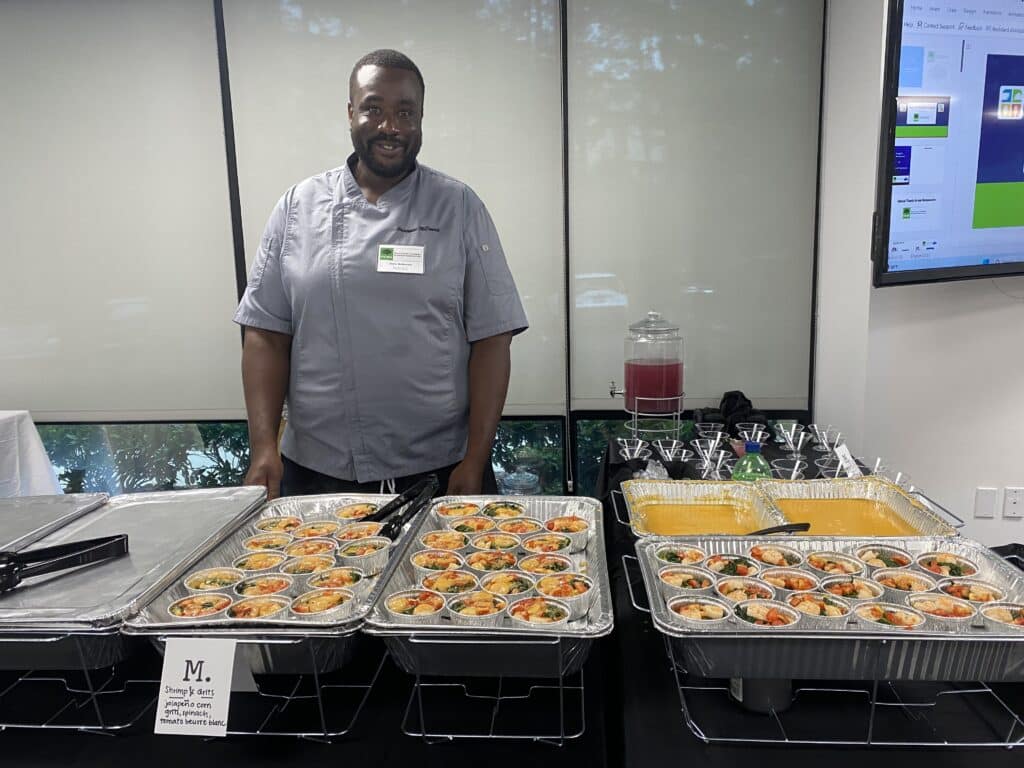
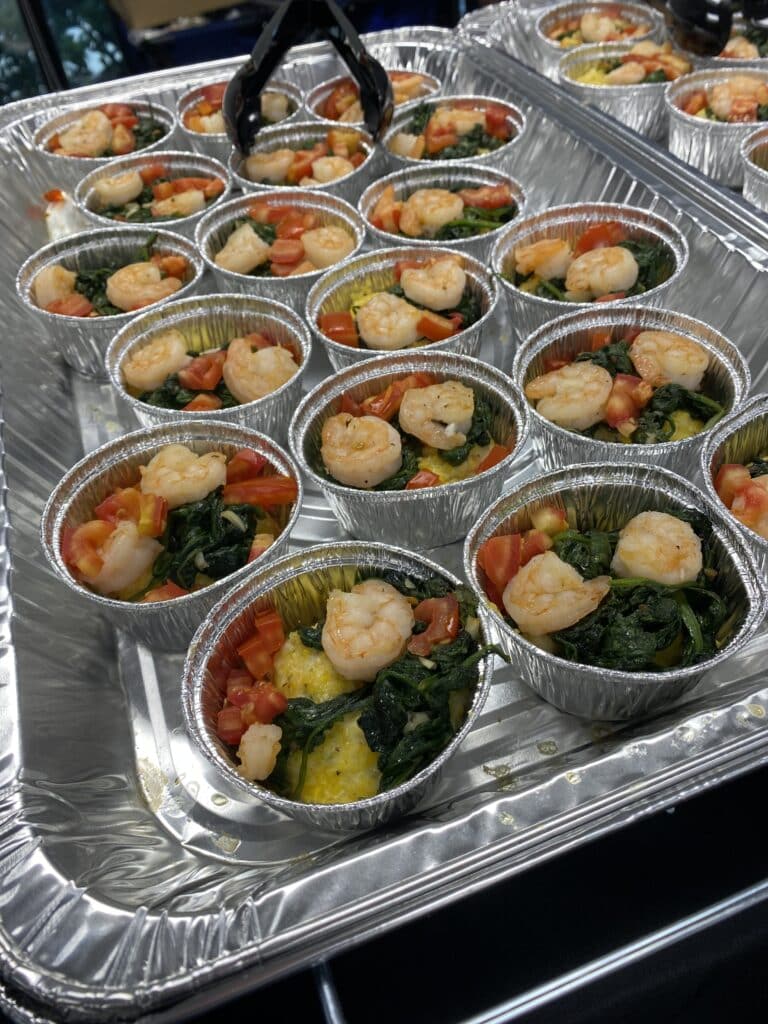
Another familiar face was set up on the other side of the room. J.R.’s Log House Restaurant served southern favorites like pulled pork sliders, baked beans and mac n’ cheese. I couldn’t pass this one up. The pulled pork was tender, tangy and saucy. Exactly what I want from a barbecue. Lazy Dog’s table really impressed me with its presentation. The tuna cup with rice, avocado and chili with chips on the side, was a real stunner.
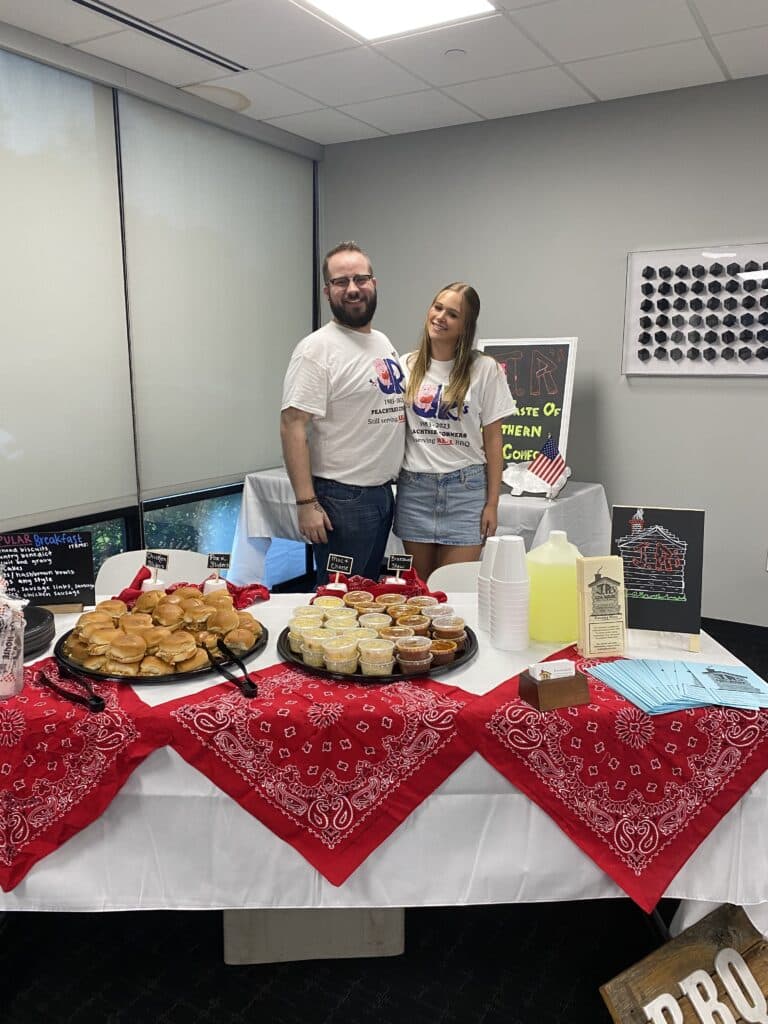
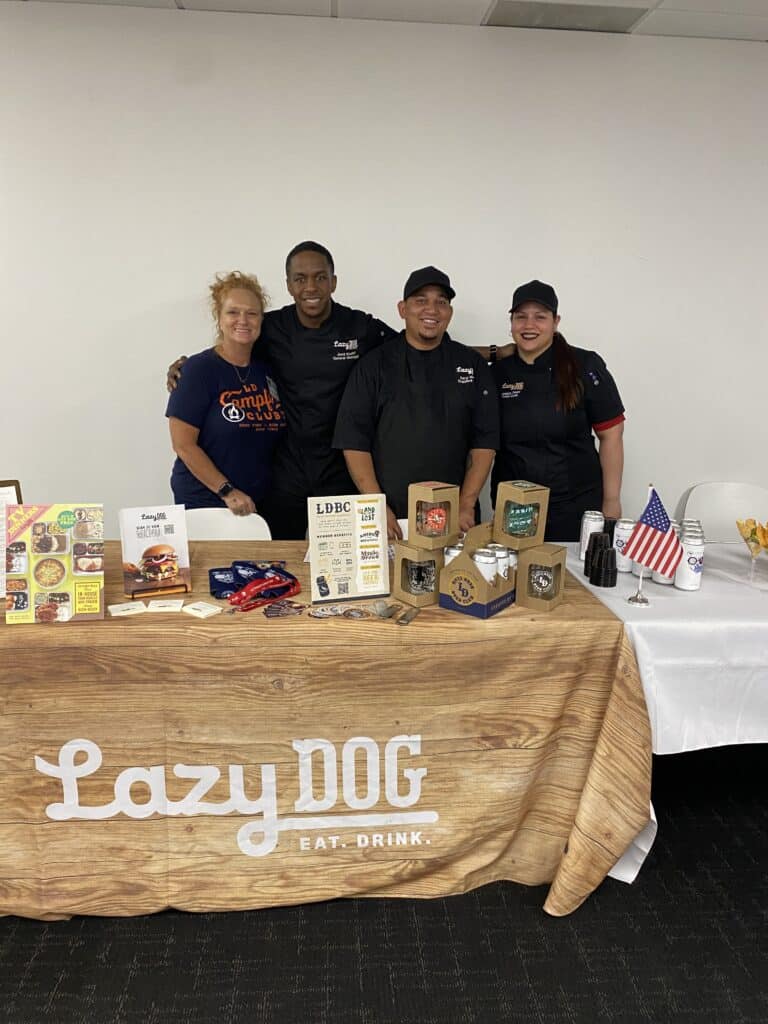
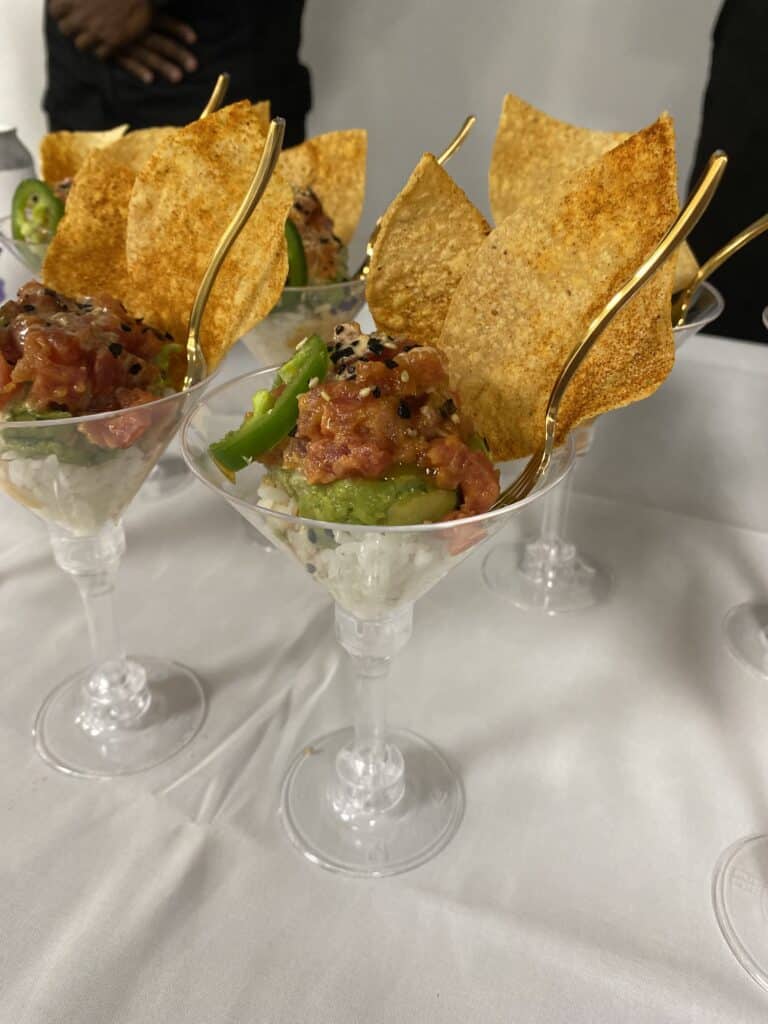
Moe’s Southwest Grill was also on-site handing out tasty tequila lime chicken with rice, avocado, and black beans. This super hearty and comforting entrée was followed by a seafood course from PECHE Modern Coastal. Crab cakes with a croissant pinwheel, roasted garlic and lemon aioli and arugula were on the menu and the flavor combinations were simply fantastic.
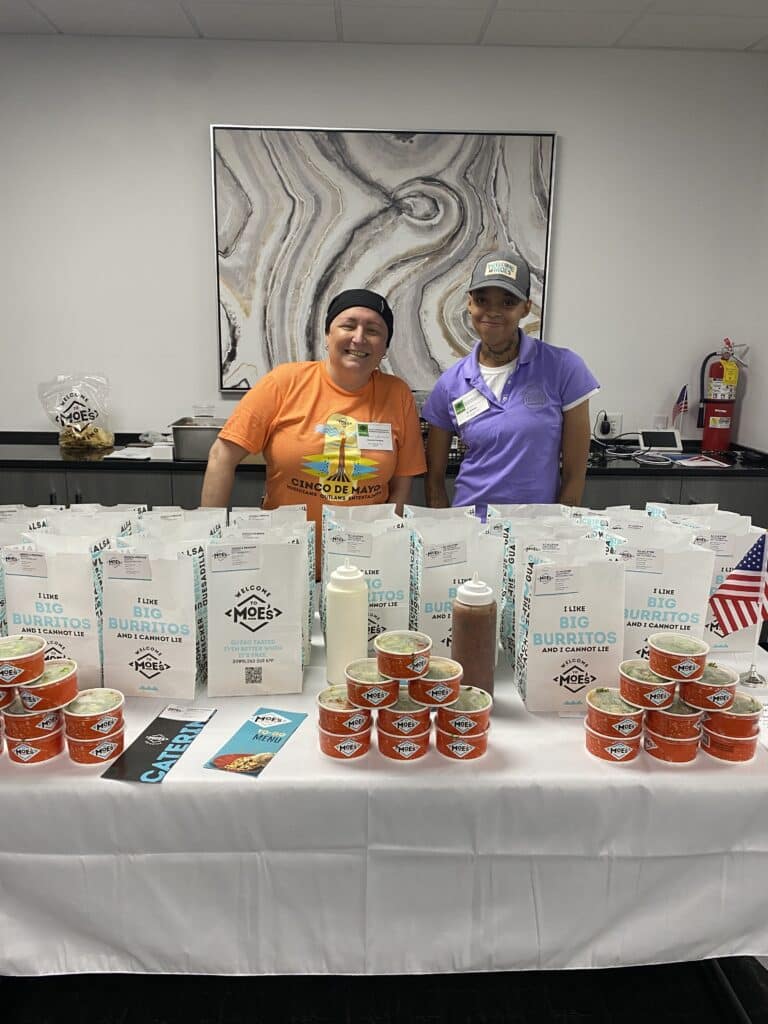
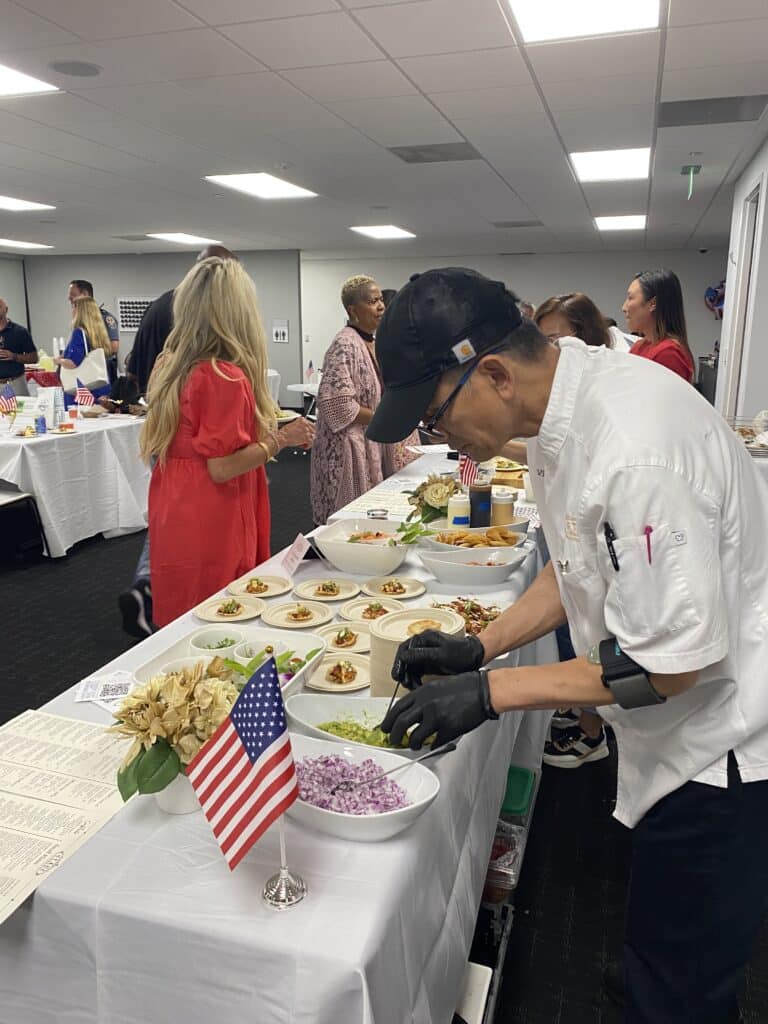
PECHE’s sister restaurant STAGE Kitchen & Bar was next door offering a tuna and salmon tostada with avocado, eel sauce, spicy mayo, and cilantro. This was easily one of my favorite bites of the night. The tostada was crunchy and light with clean and bright flavors. No kidding, I could probably eat this every day for lunch.
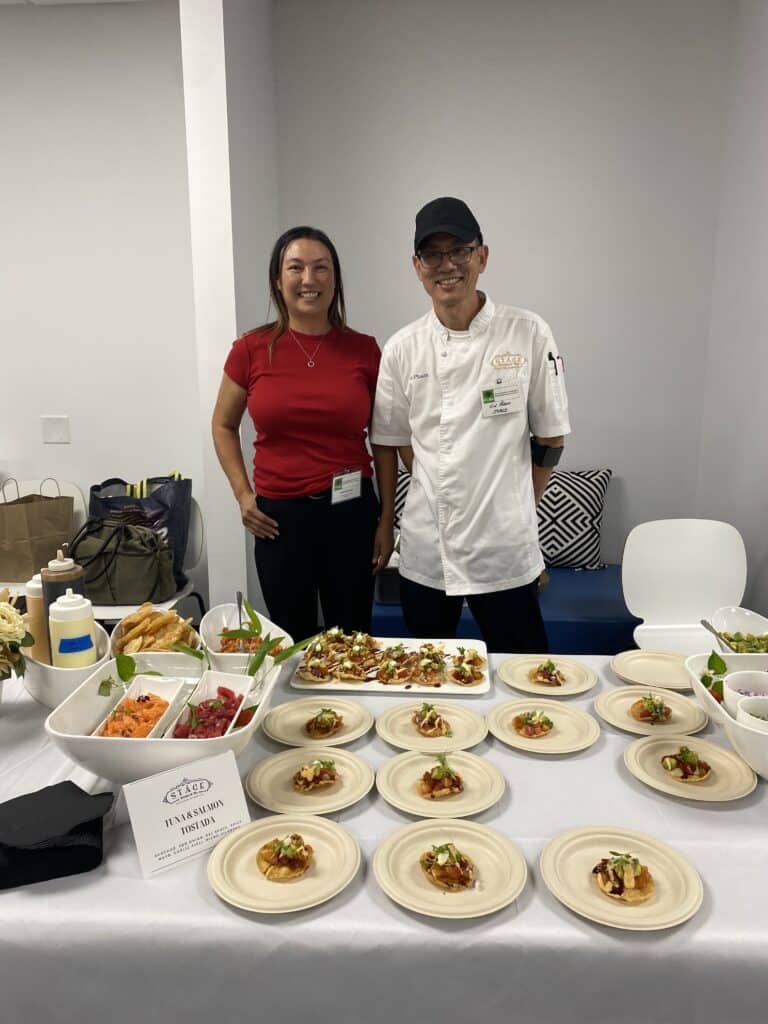
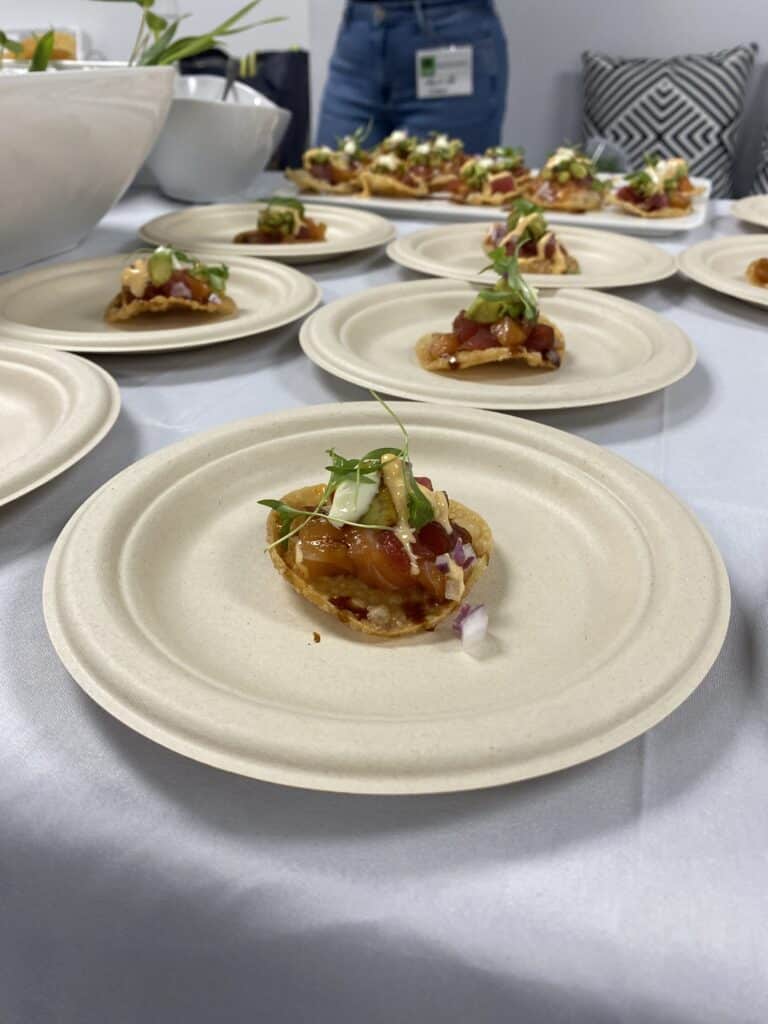
I moved on the Smoke’s Family Catering and owner Phillip Smoke had whipped up enough barbecue to feed an army. I had the pleasure of trying the smoked chicken with potato salad and it was the perfect pairing. Last but not least: dessert. I capped off the evening with a beautiful chocolate ganache-filled croissant with perfect lamination and flaky texture.
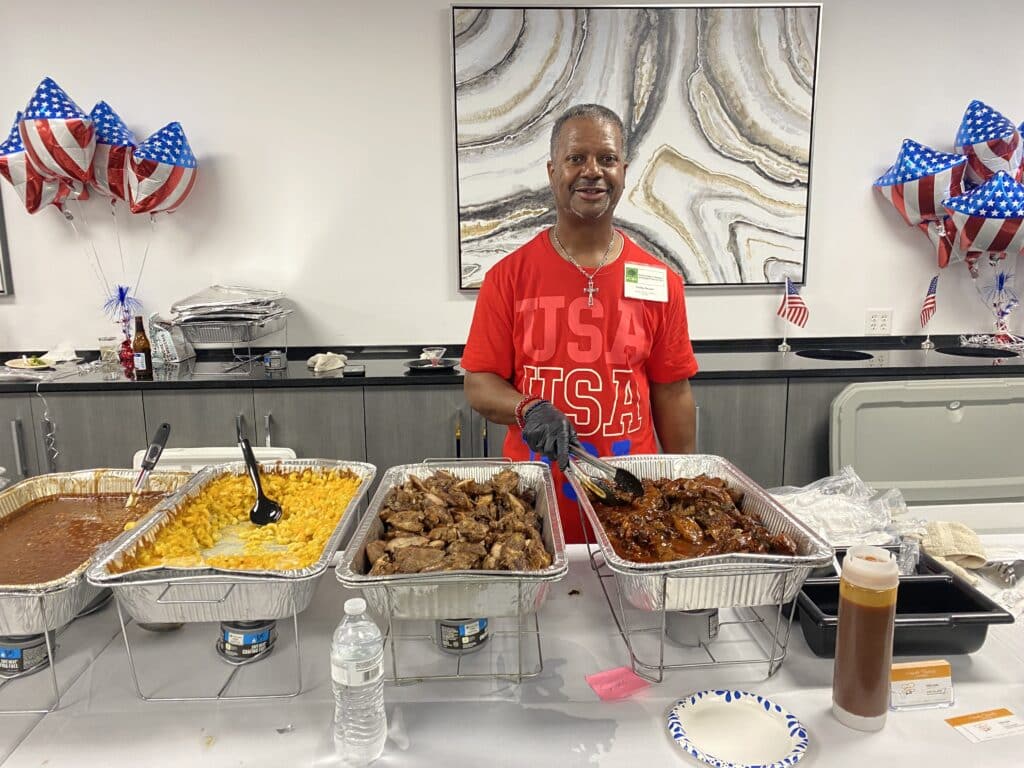
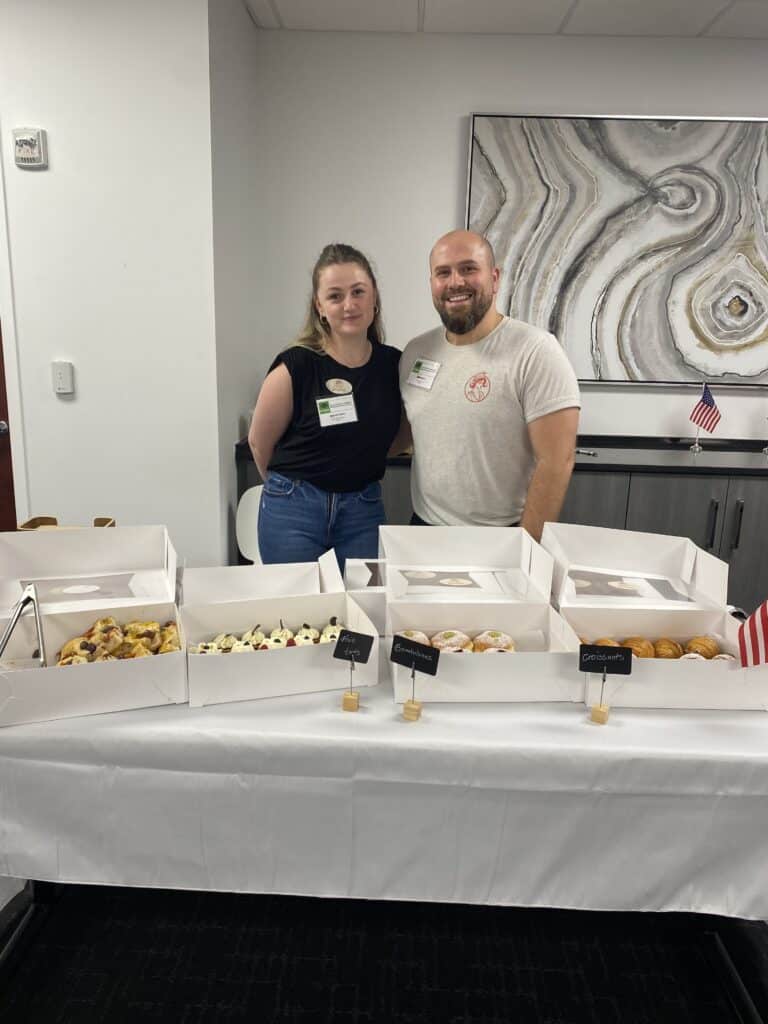
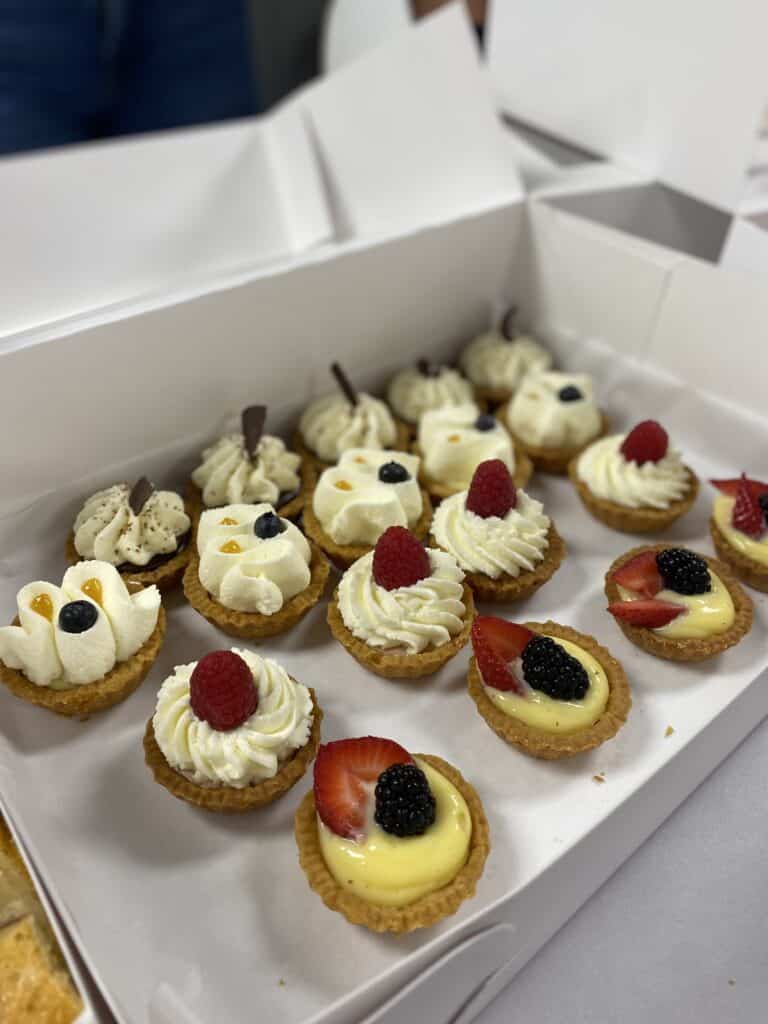
The inspiration behind the event
With a (very) full stomach, I caught up with PCBA President Lisa Proctor to talk about the event.
“We knew that COVID was really hard on a lot of our restaurants to get people back in,” said Proctor. “We wanted to do it in June because we wanted to celebrate our military. Everybody remembers them maybe on Memorial Day or different things, but June is the 80th anniversary of D-Day.”
“The military is always close to our heart,” she added. “We’re also very proud of our restaurants. They all have gone above and beyond.”
Tonight, the PCBA was honoring the Armed Forces and its brave veterans while bestowing two donation checks to very worthy causes.
The first check for $500 went to Folds of Honor. Since 2007, Folds of Honor has provided life-changing scholarships to the spouses and children of America’s fallen or disabled military. And now, their mission expands to the families of America’s first responders.
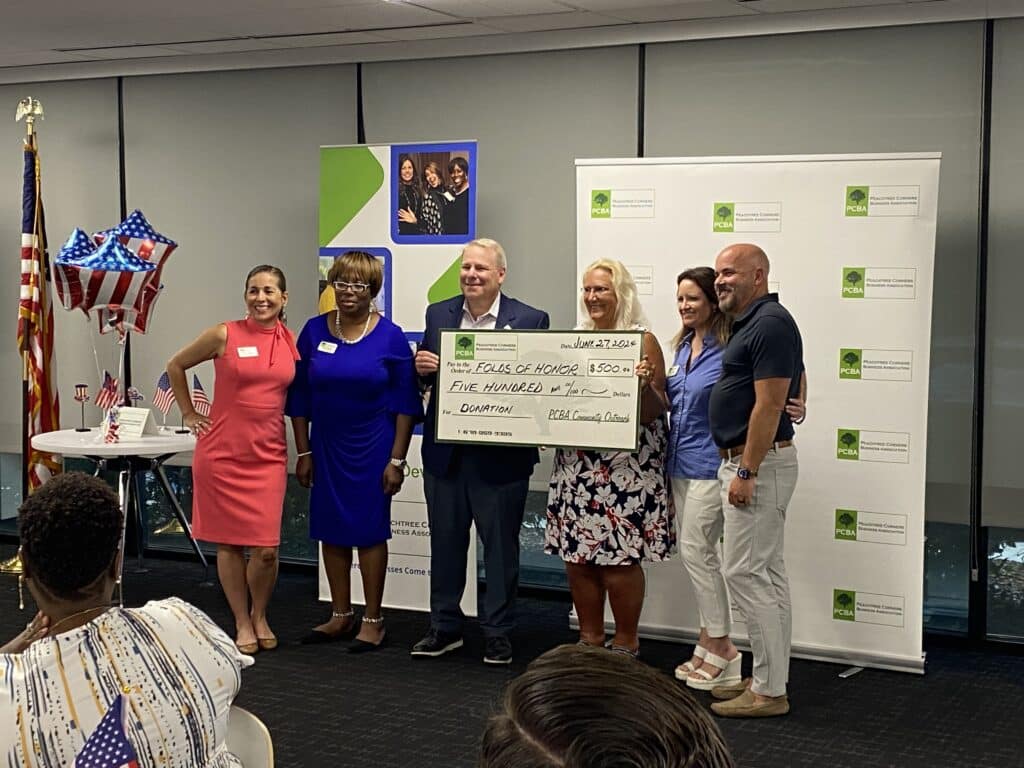
The second check for $500 was given to Light Up the Corners, a 501(c)(3) volunteer organization with an annual glowing, flashing, blinking, shining, nighttime running party and fundraiser in one. All proceeds from the event go to benefit less fortunate children and families in the Peachtree Corners community who are struggling by giving them the chance to participate in life-enhancing programs and activities at the Fowler YMCA.

Over the past 12 years, the PCBA has awarded 19 scholarships and donated more than $156,000+ back to the Peachtree Corners community.
Related
Business
Local Resident Opens AtWork Location in Peachtree Corners
Published
2 weeks agoon
July 10, 2024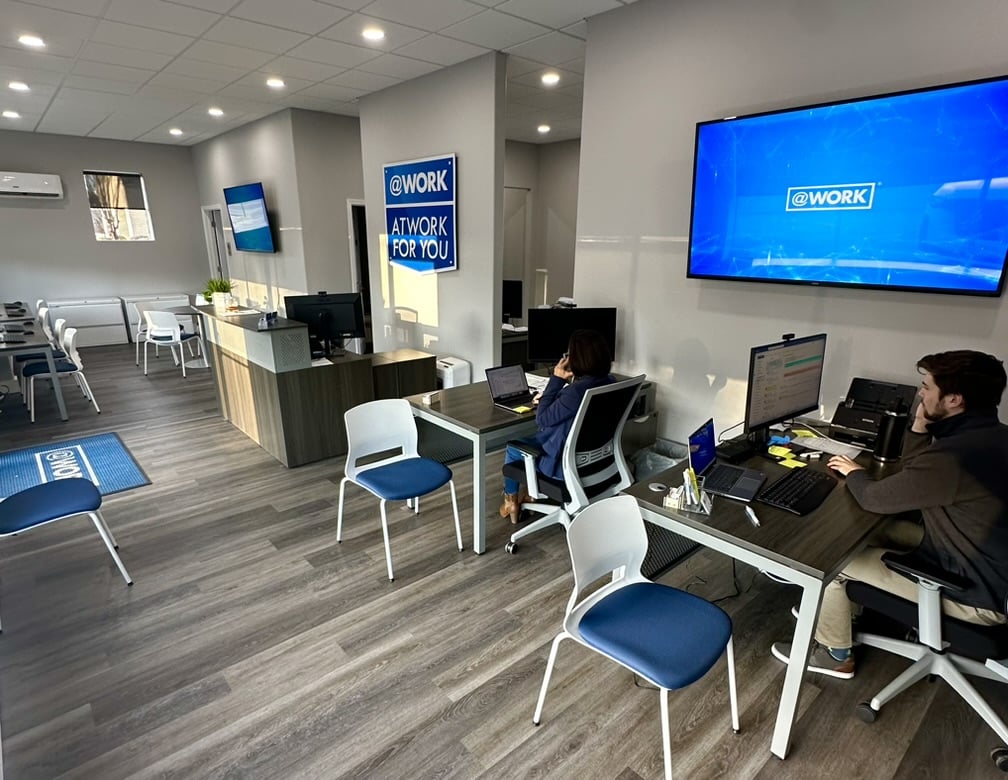
AtWork, one of nation’s leading staffing franchises, has opened its third Metro Atlanta location in Peachtree Corners, Georgia at 6185 Buford Highway, Suite E-100.
AtWork Peachtree Corners is locally-owned by Kamal Bhatia, an immigrant from India with decades of experience in hospitality and as the Senior Vice President of Operations of Atlanta-based Action Bartending School.
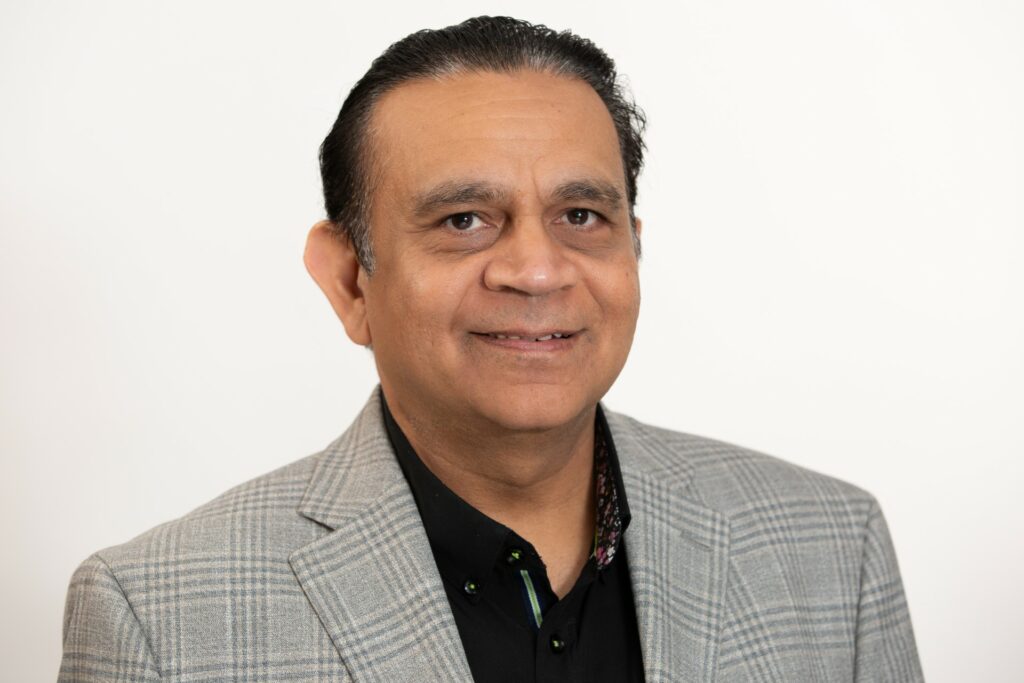
“There is an incredible need for AtWork’s services in Peachtree Corners,” said Bhatia. “Since migrating here in 1996, I’ve witnessed Atlanta evolve and sprout new communities north of the city, including my own. Peachtree Corners has become a hub for thriving businesses, and my goal with this location is to be a key resource between companies and job seekers to support the continued growth of our local economy.”
Bhatia’s son and daughter will assist him in the business.
“This is an opportunity to create a legacy company to ensure our community is supported for generations to come,” he said.
For more than three decades, AtWork’s mission has been to connect people with jobs and jobs with people. With more than 100 locations nationwide, AtWork puts nearly 40,000 individuals to work each year in administrative, light-industrial, accounting and finance, hospitality, IT and management-level positions at some of the nation’s largest and most recognizable companies.
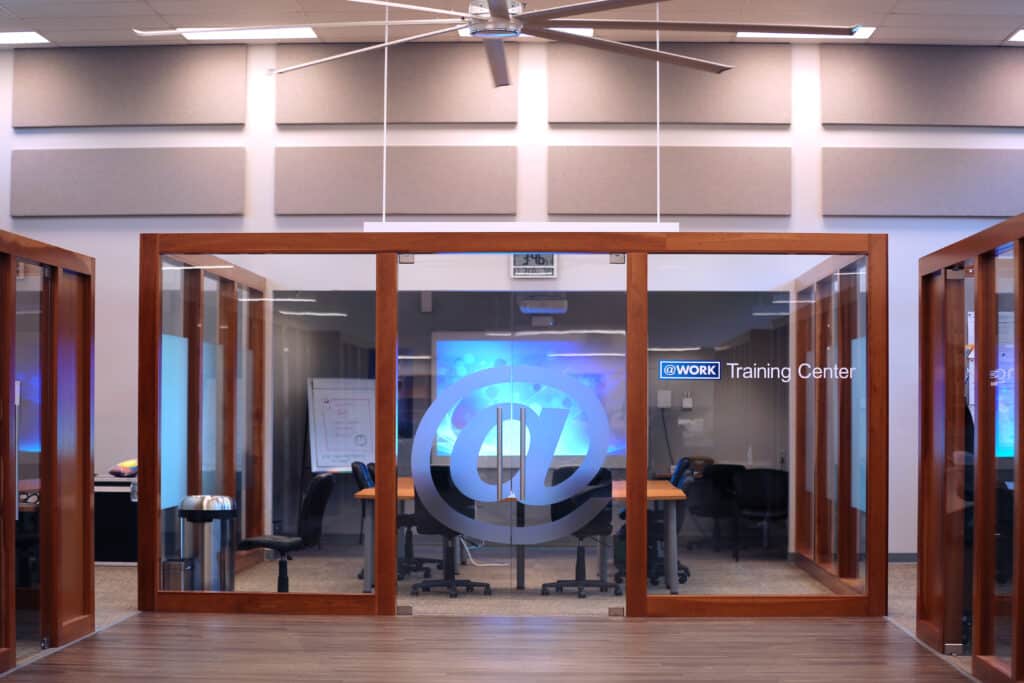
“We’re proud to open our doors in Peachtree Corners and provide a common place for both job seekers and growing businesses to turn for staffing solutions,” said Jason Leverant, President and COO of AtWork.
“AtWork will serve as a key resource to help employees thrive, businesses prosper and communities flourish. Kamal is the perfect partner to champion our mission and be a servant leader in her local community,” he added.
Related
Read the Digital Edition
Subscribe
Keep Up With Peachtree Corners News
Join our mailing list to receive the latest news and updates from our team.
You have Successfully Subscribed!

Taste of Peachtree Corners: PCBA Showcases Local Restaurants

What’s going on at Jones Bridge Park and the Challenges of Urban Development

The Forum Gives Sneak Peek of New Eateries and Community Spaces

Southwest Gwinnett Mayors Share Visions for the Future

Peachtree Corners Shines Bright with Light Up the Corners Glow Race this August

8 Events Happening In and Around Peachtree Corners This August

Peachtree Corners Shines Bright with Light Up the Corners Glow Race this August

The Forum Gives Sneak Peek of New Eateries and Community Spaces

8 Events Happening In and Around Peachtree Corners This August

Southwest Gwinnett Mayors Share Visions for the Future

Taste of Peachtree Corners: PCBA Showcases Local Restaurants

What’s going on at Jones Bridge Park and the Challenges of Urban Development

Local Resident Opens AtWork Location in Peachtree Corners

CHRIS 180 Expands its Services into Gwinnett County [Podcast]

Light up the Corners [Video]

Capitalist Sage: Business Leadership in Your Community [Podcast]

Cliff Bramble: A Culinary Adventure through Italy

Top 10 Brunch Places in Gwinnett County

A Hunger for Hospitality

THE CORNERS EPISODE 3 – BLAXICAN PART 1

Top 10 Indoor Things To Do This Winter

The ED Hour: What it takes to Remove Barriers from Education
Peachtree Corners Life
Topics and Categories
Trending
-
Business1 week ago
Taste of Peachtree Corners: PCBA Showcases Local Restaurants
-
Business2 days ago
The Forum Gives Sneak Peek of New Eateries and Community Spaces
-
City Government4 days ago
Southwest Gwinnett Mayors Share Visions for the Future
-
Community2 days ago
Peachtree Corners Shines Bright with Light Up the Corners Glow Race this August






